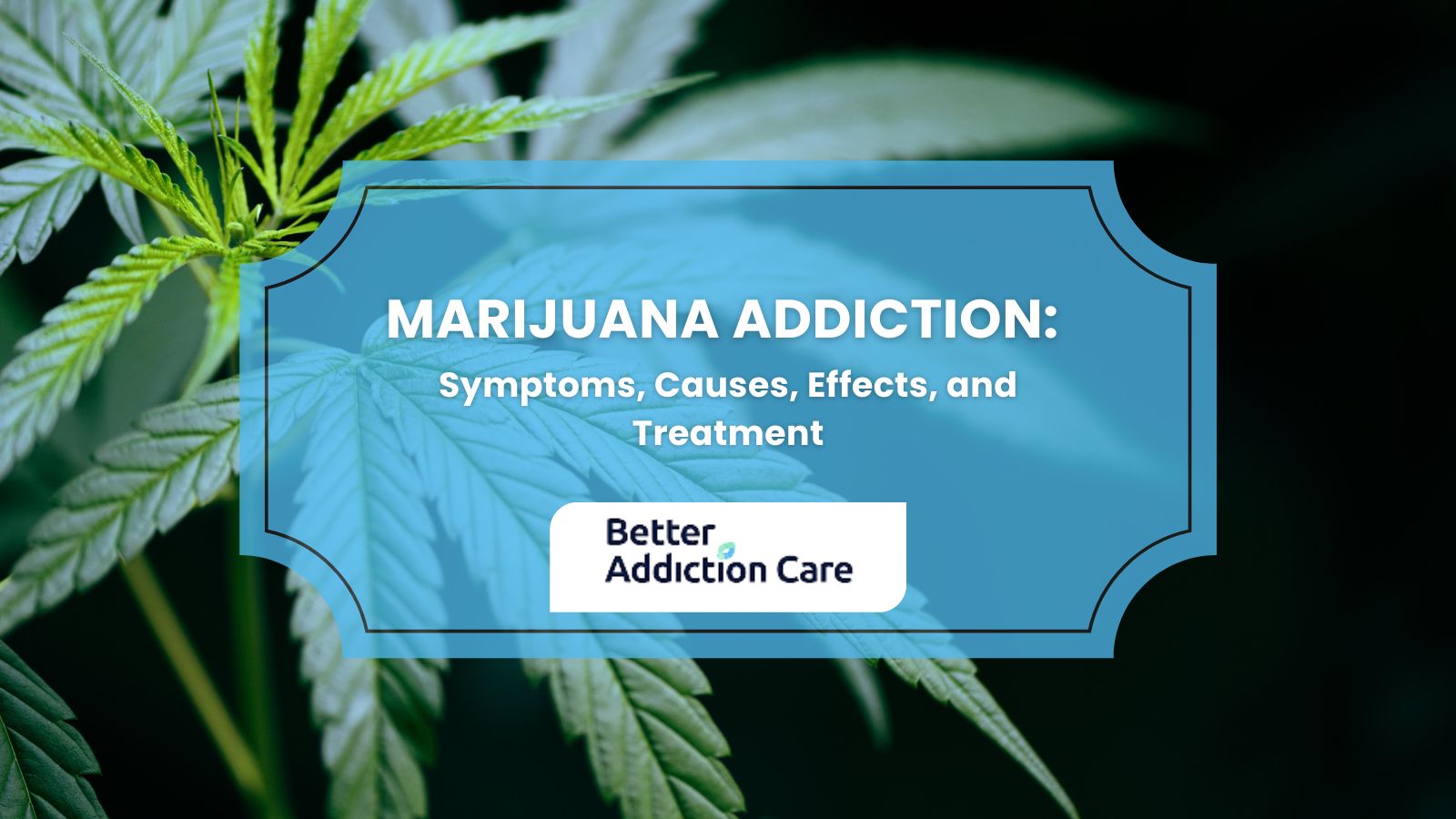429 Best Alcohol and Drug Rehabs in Arizona 2025
Discover the top alcohol and drug rehab centers in Arizona, United States. Explore 429 nearby treatment facilities providing inpatient, outpatient, and detox services.
Use filters to search by payment options, amenities, specialty programs, and more to find the perfect treatment for your unique situation.
429 Treatment Centers in Arizona, US
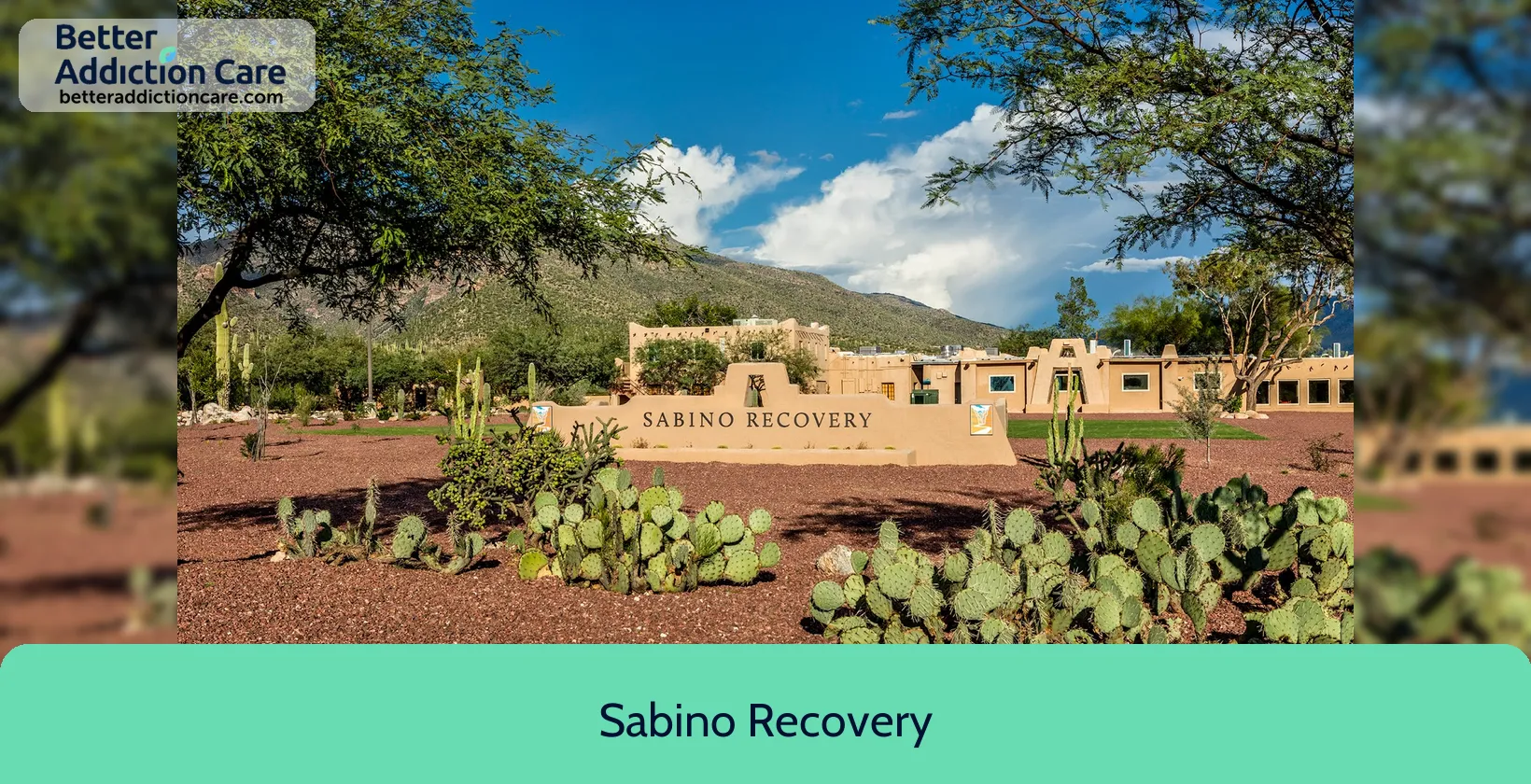
7.75
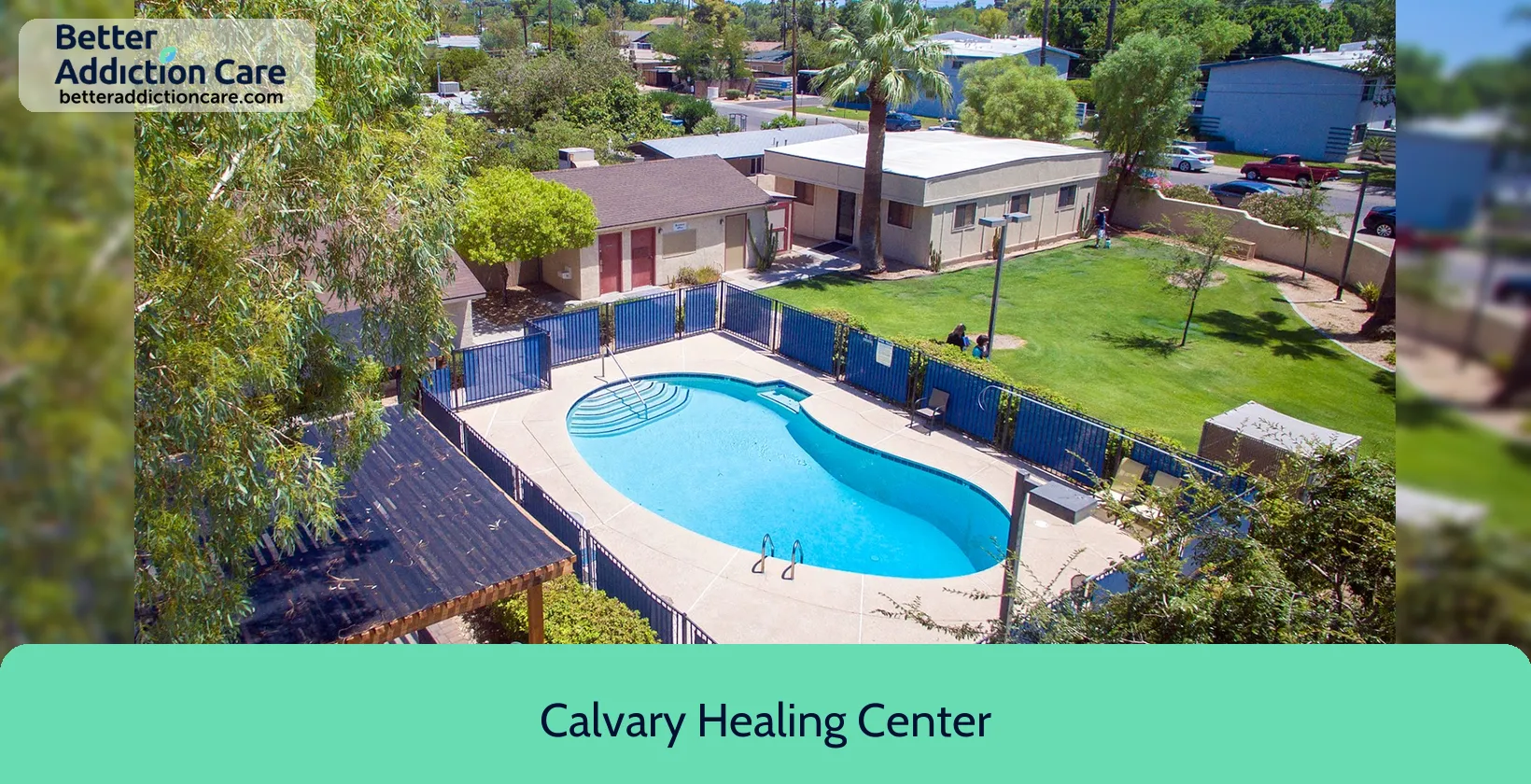
7.03
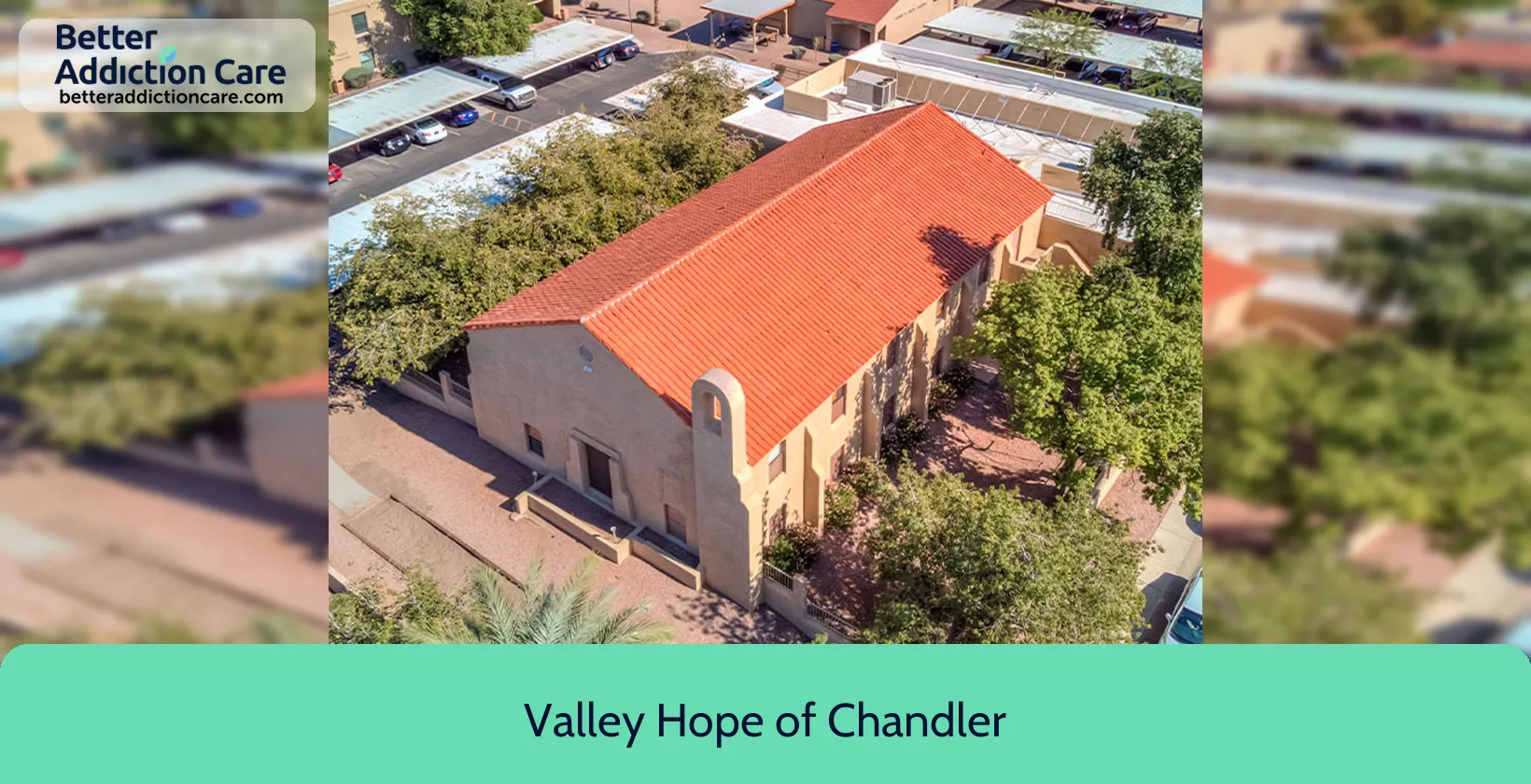
7.61
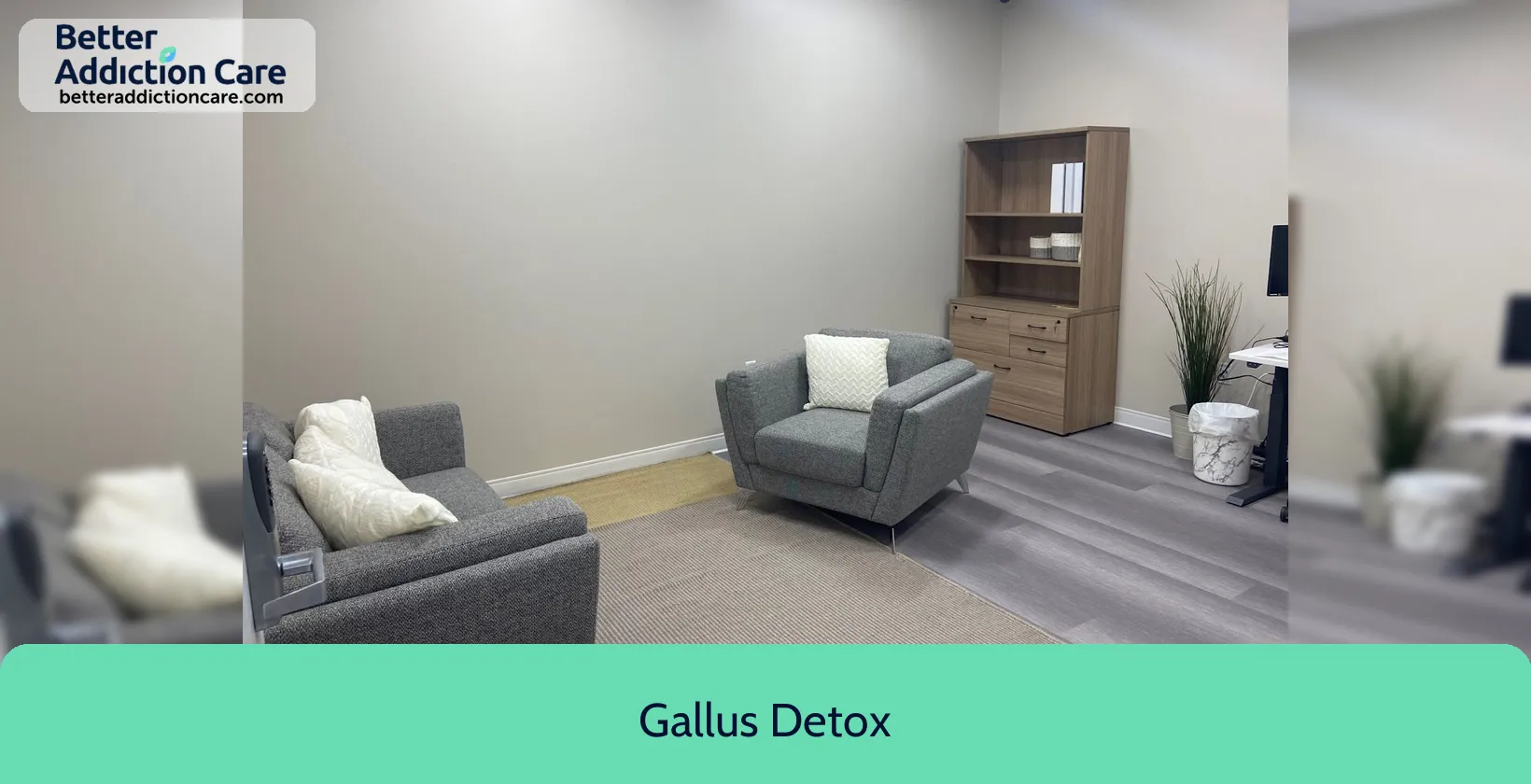
7.06
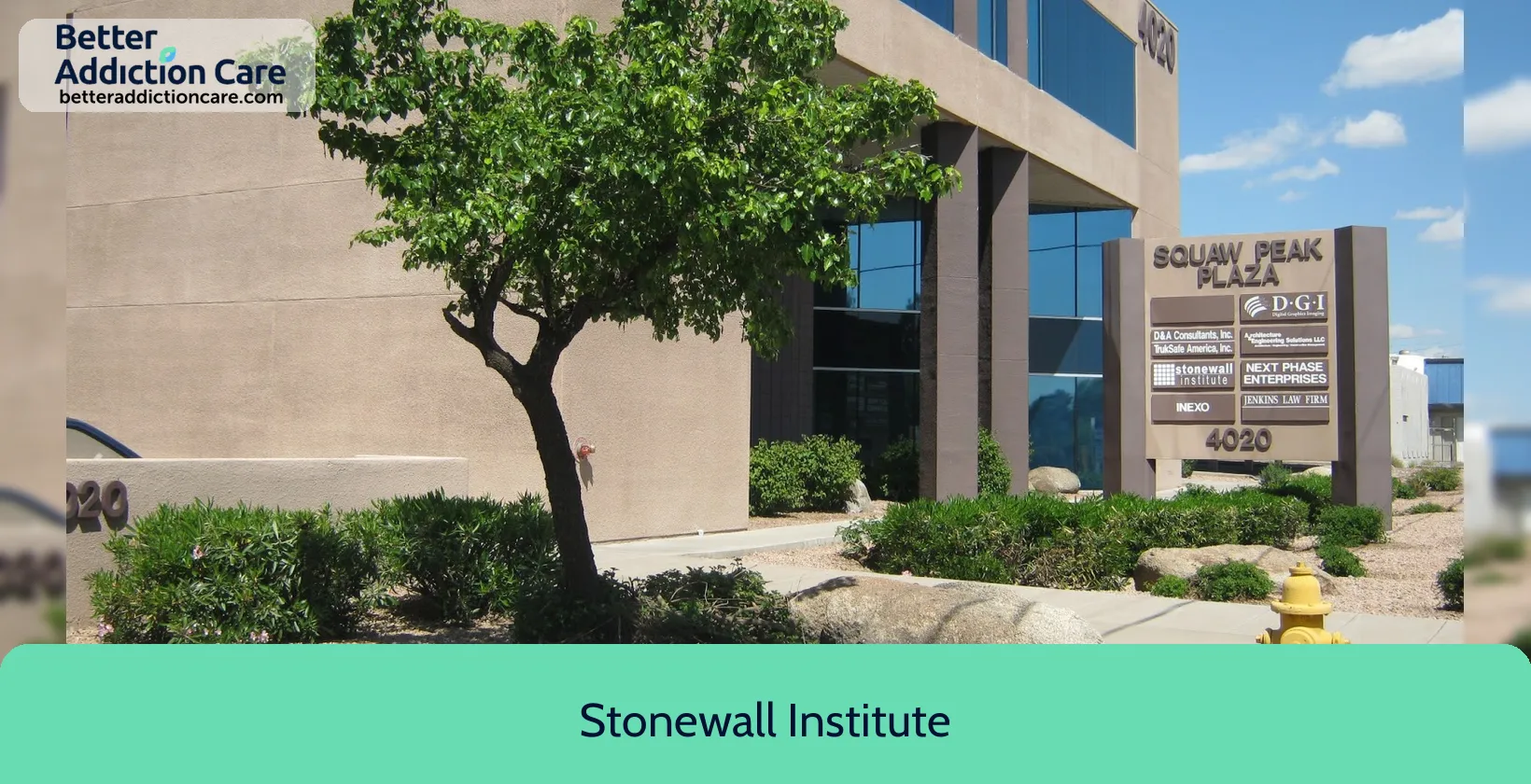
6.97
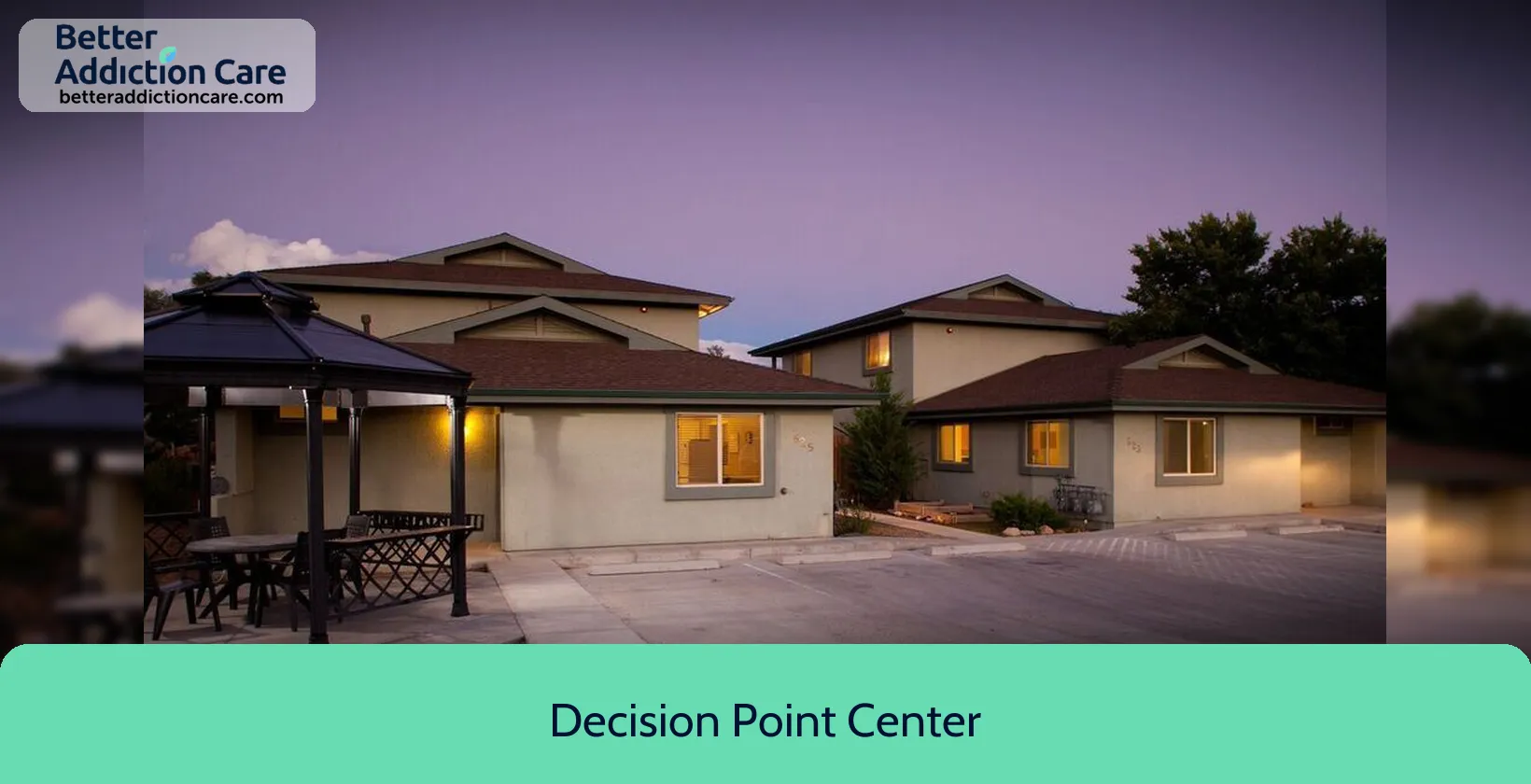
7.98
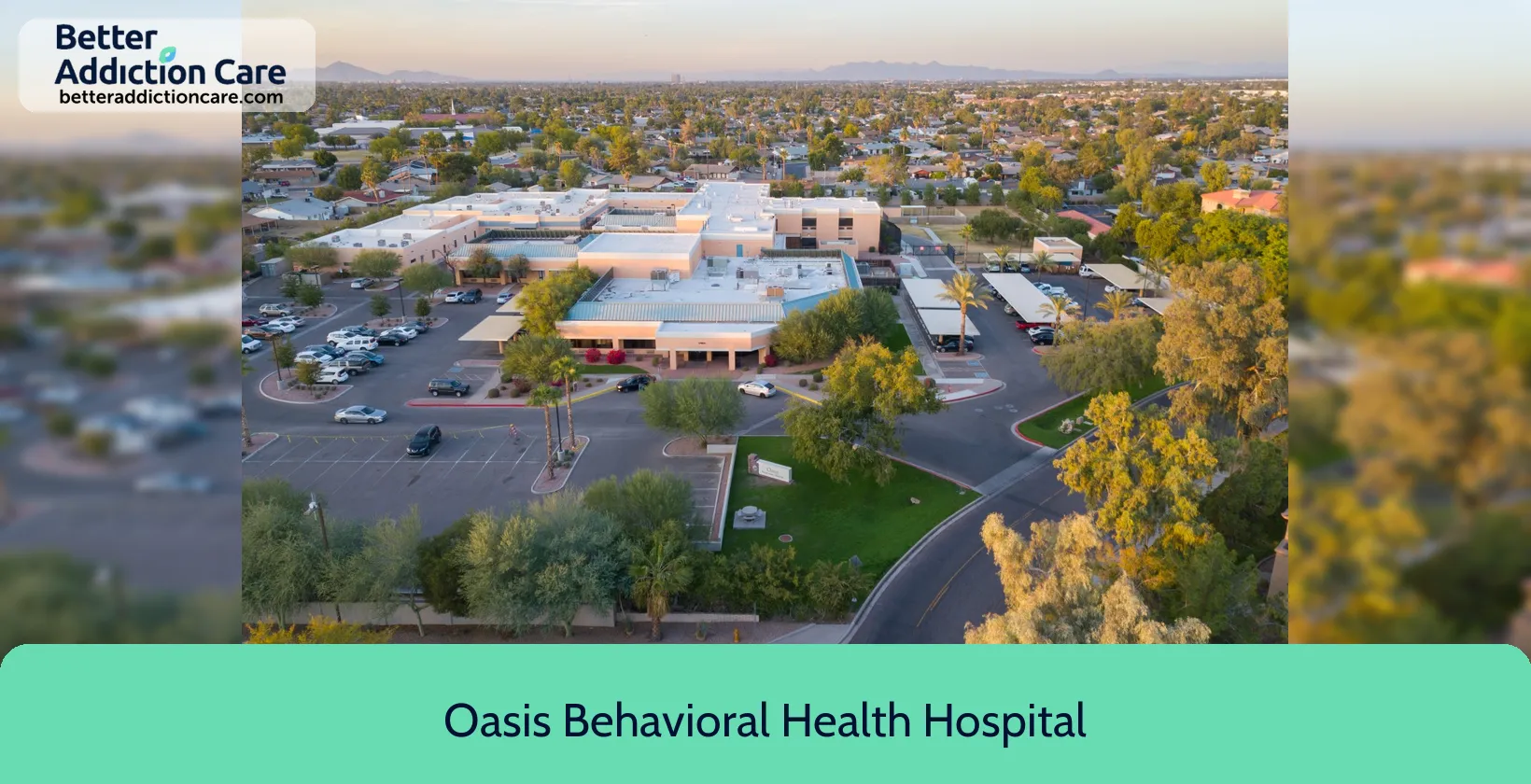
6.94
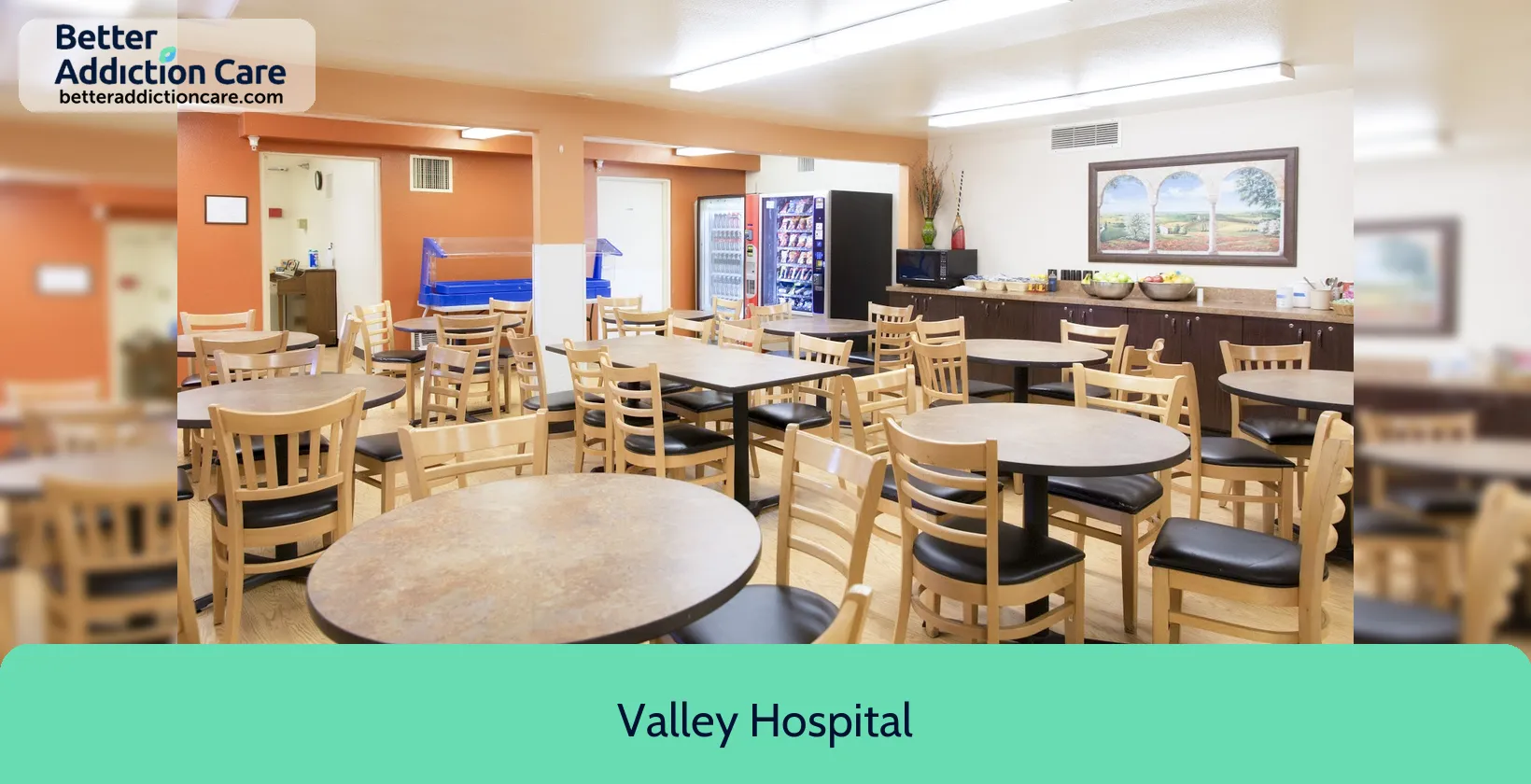
7.32
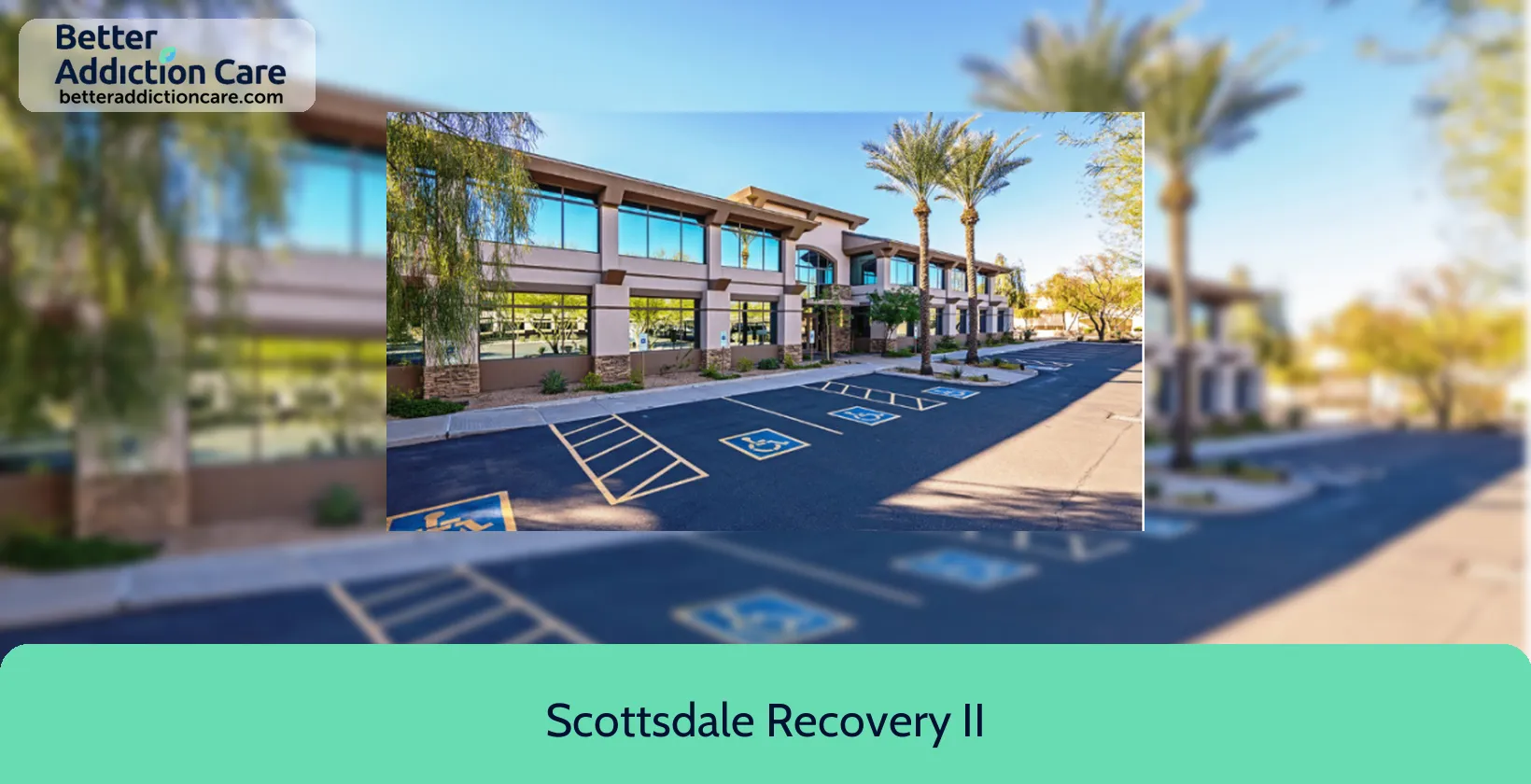
8.02
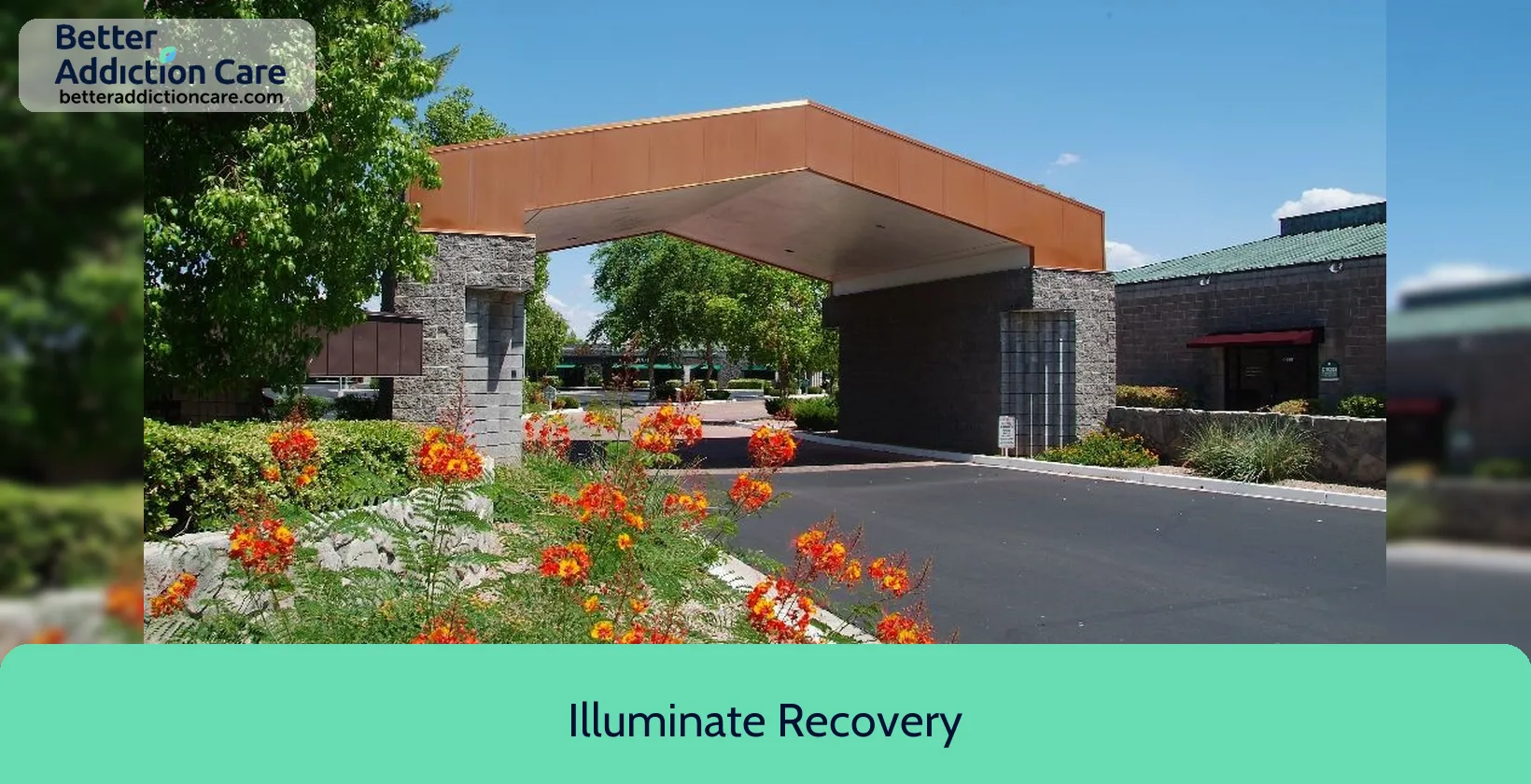
7.77
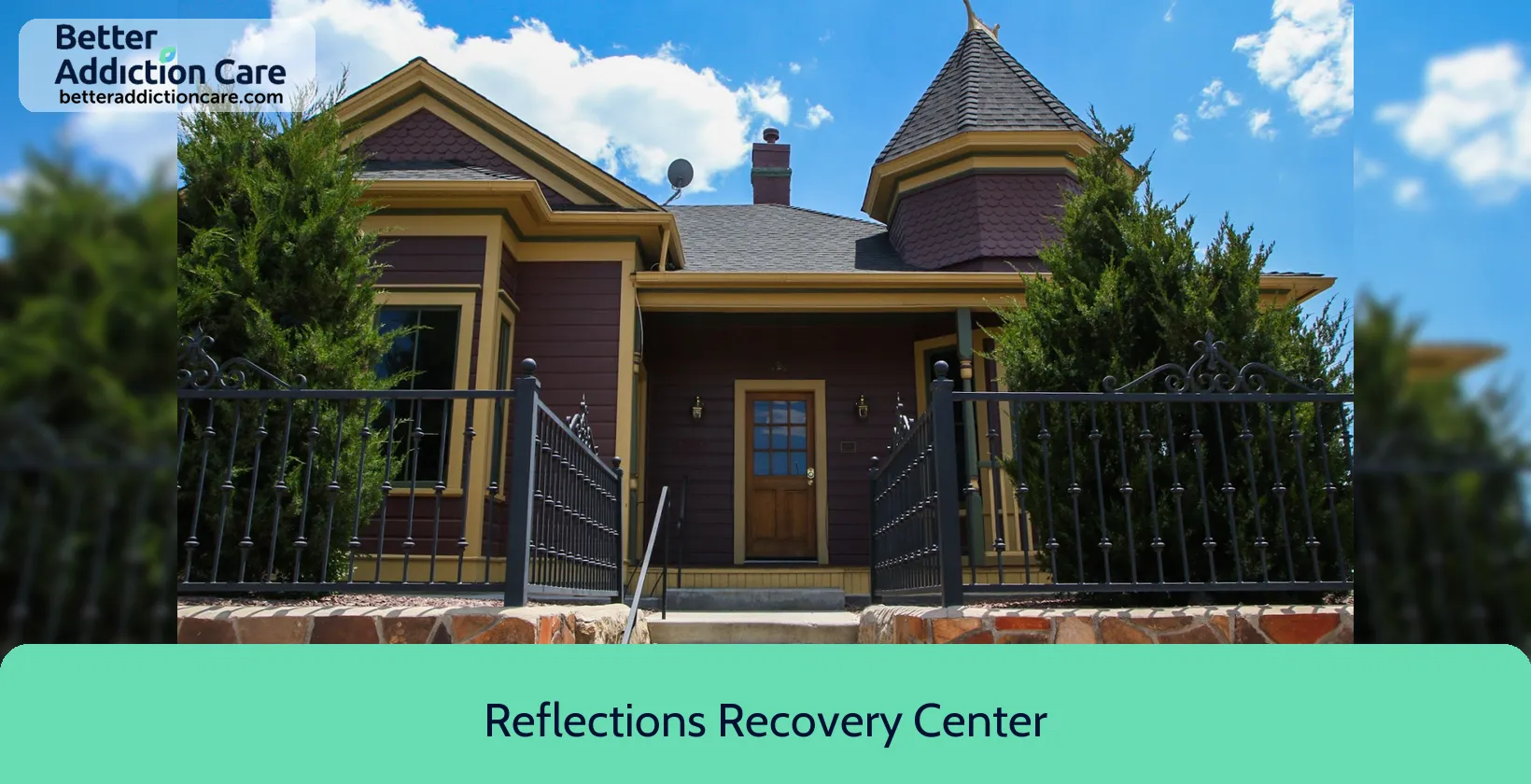
7.65
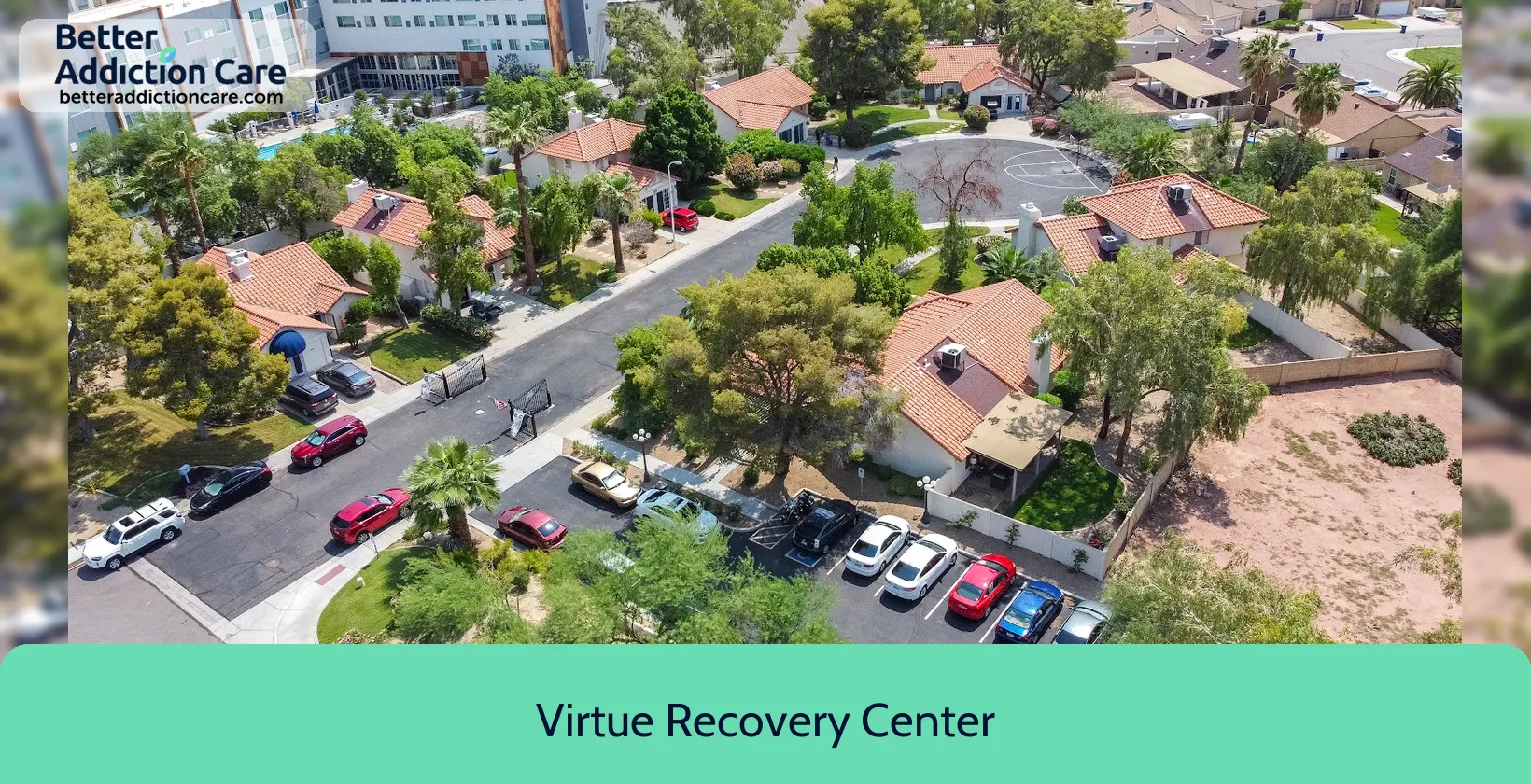
7.77
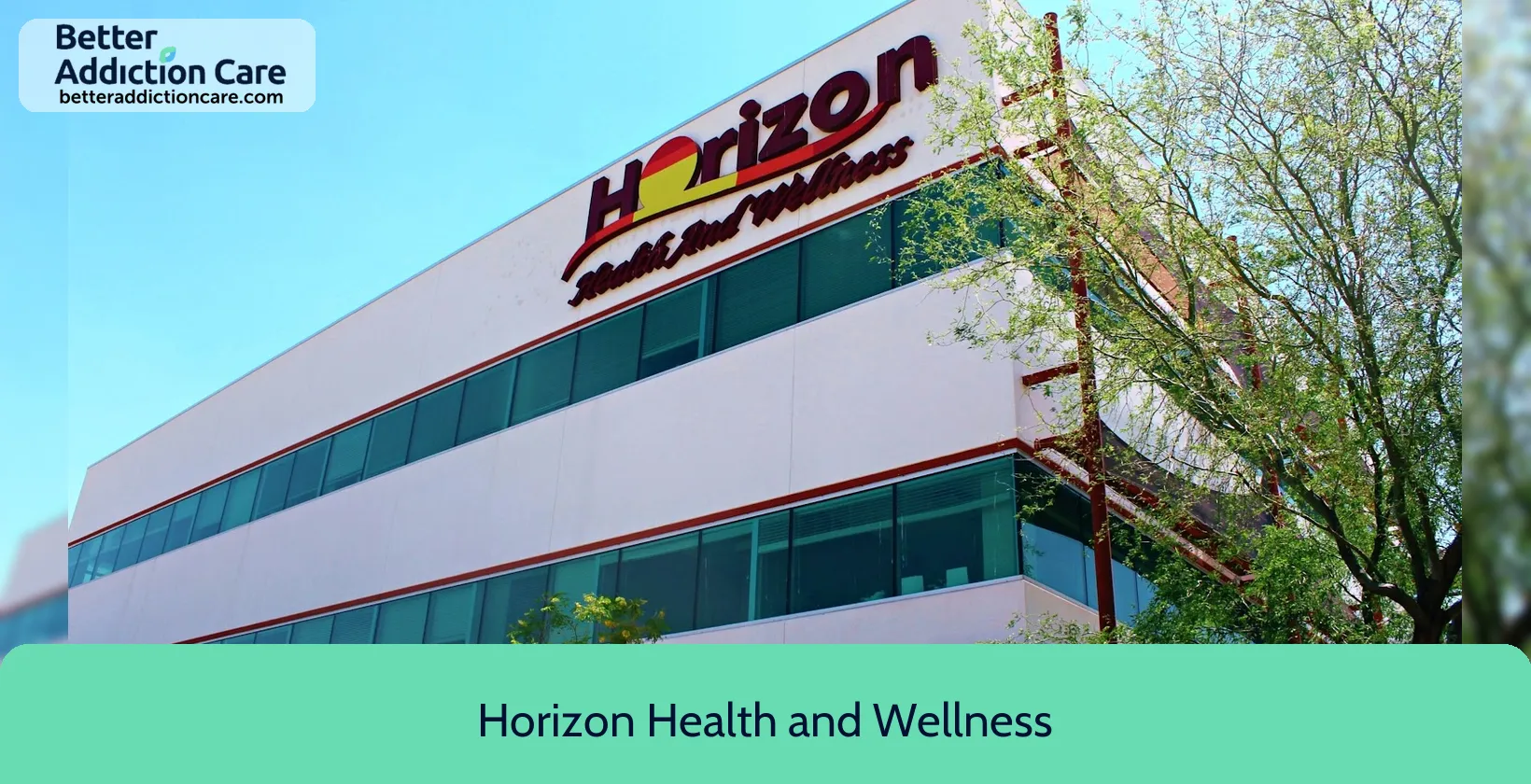
8.27
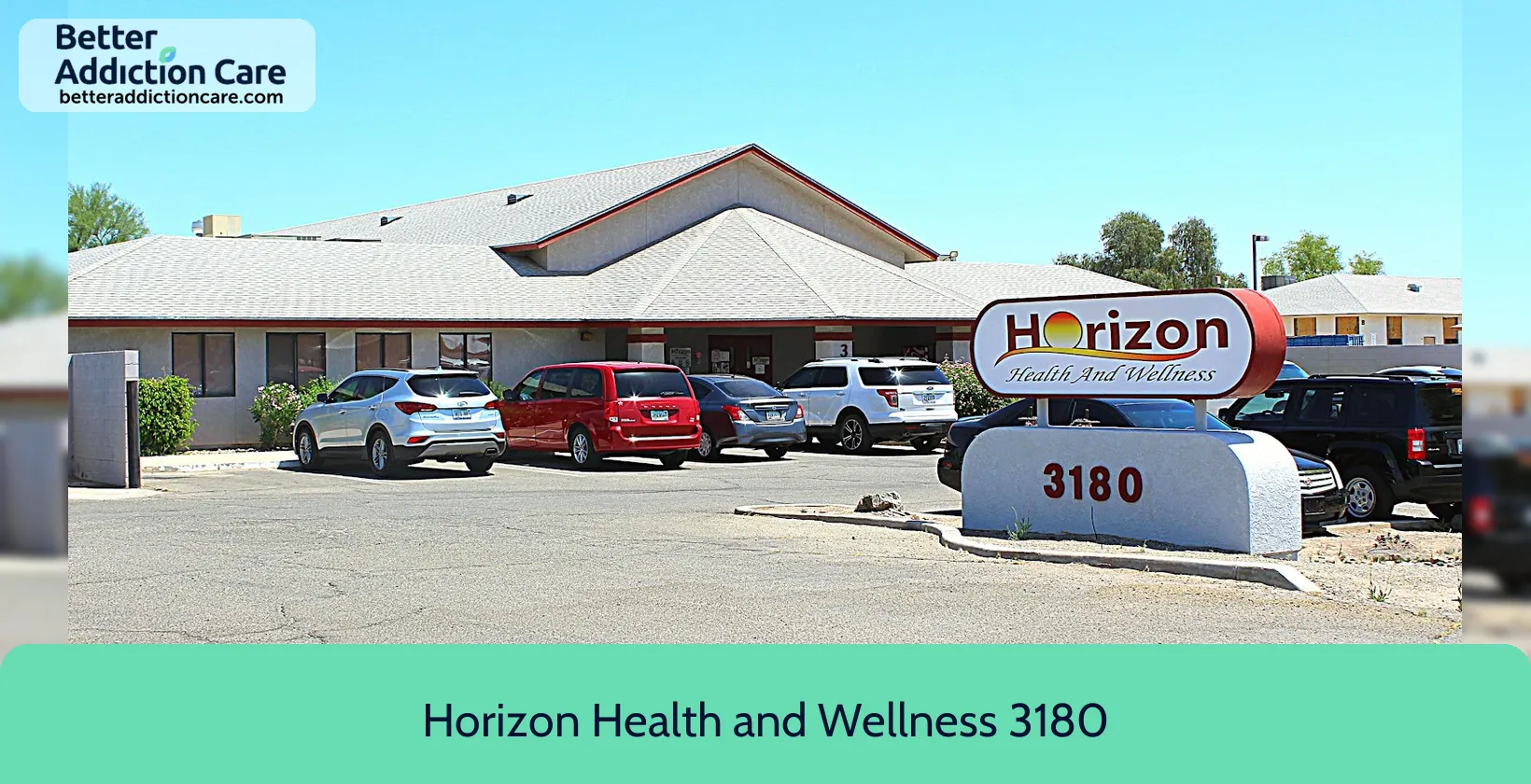
7.00

7.72

6.82
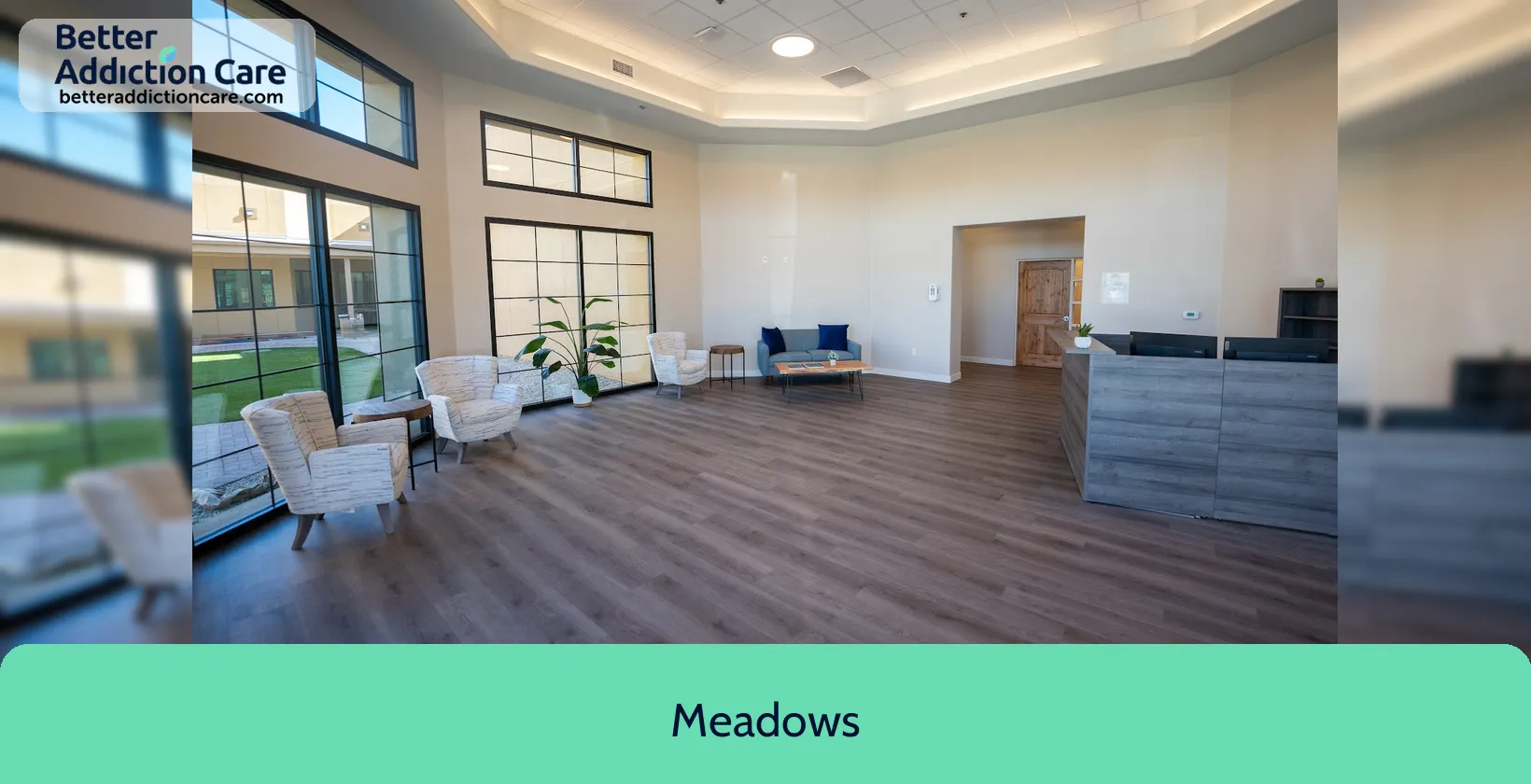
7.81
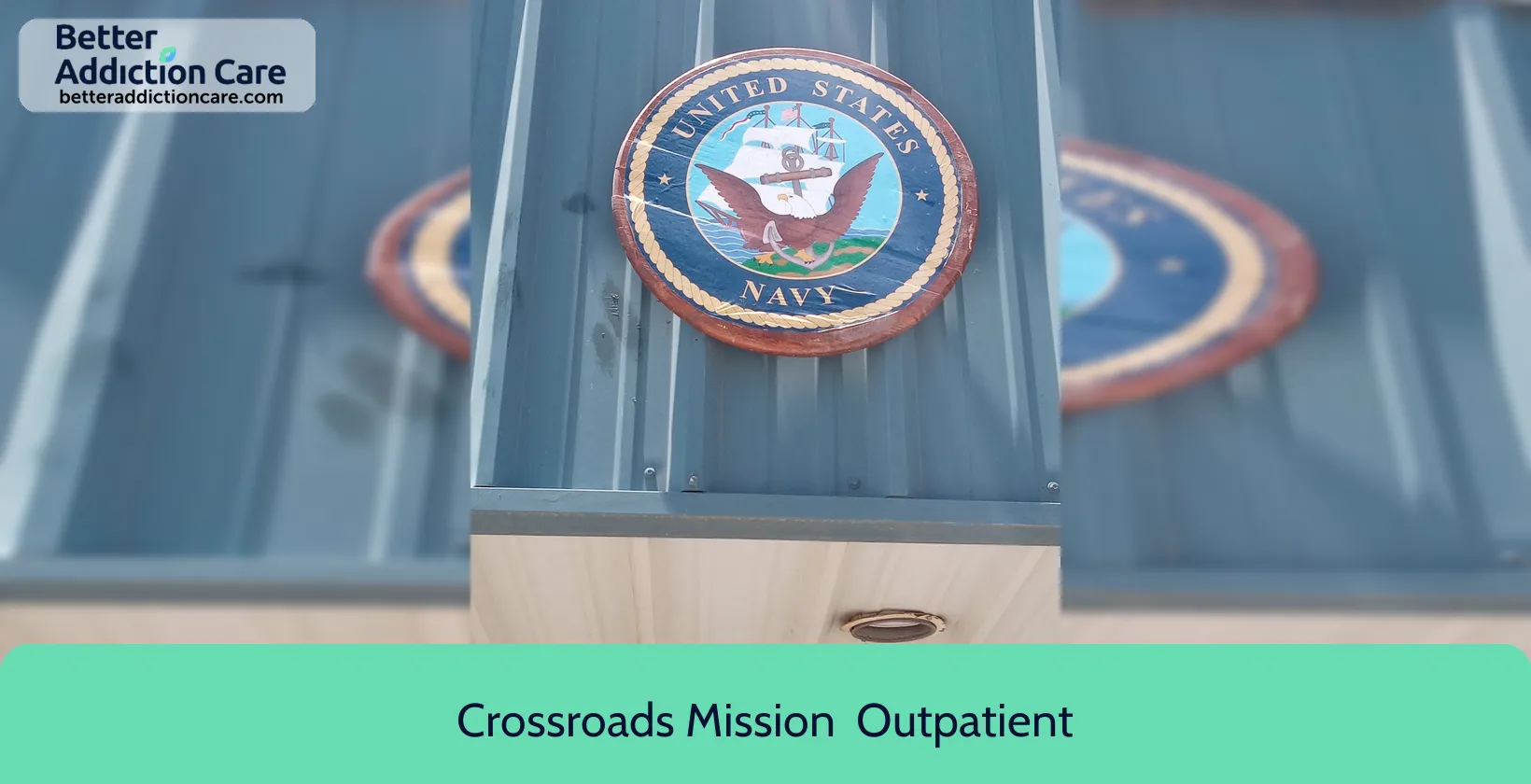
6.67
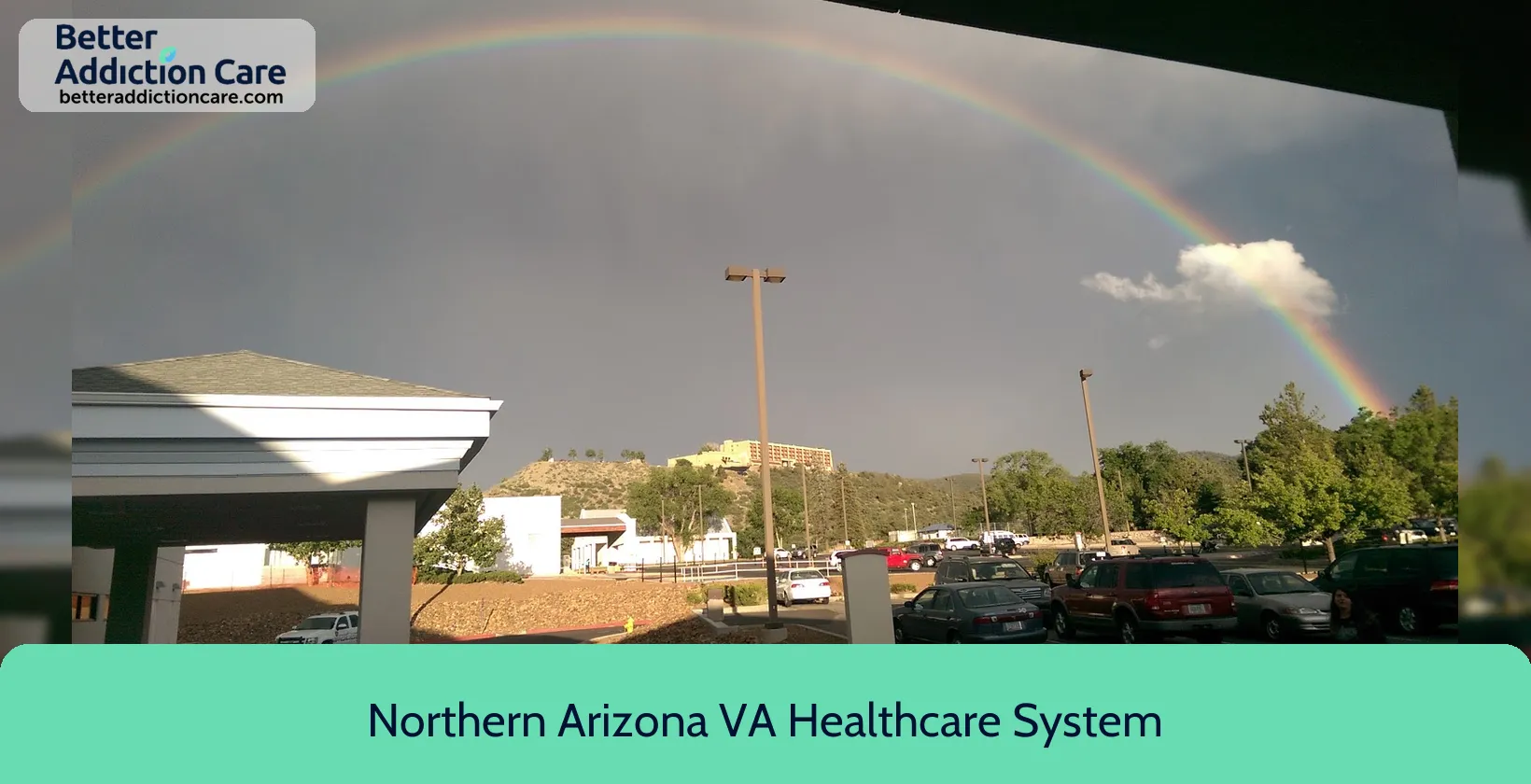
7.52
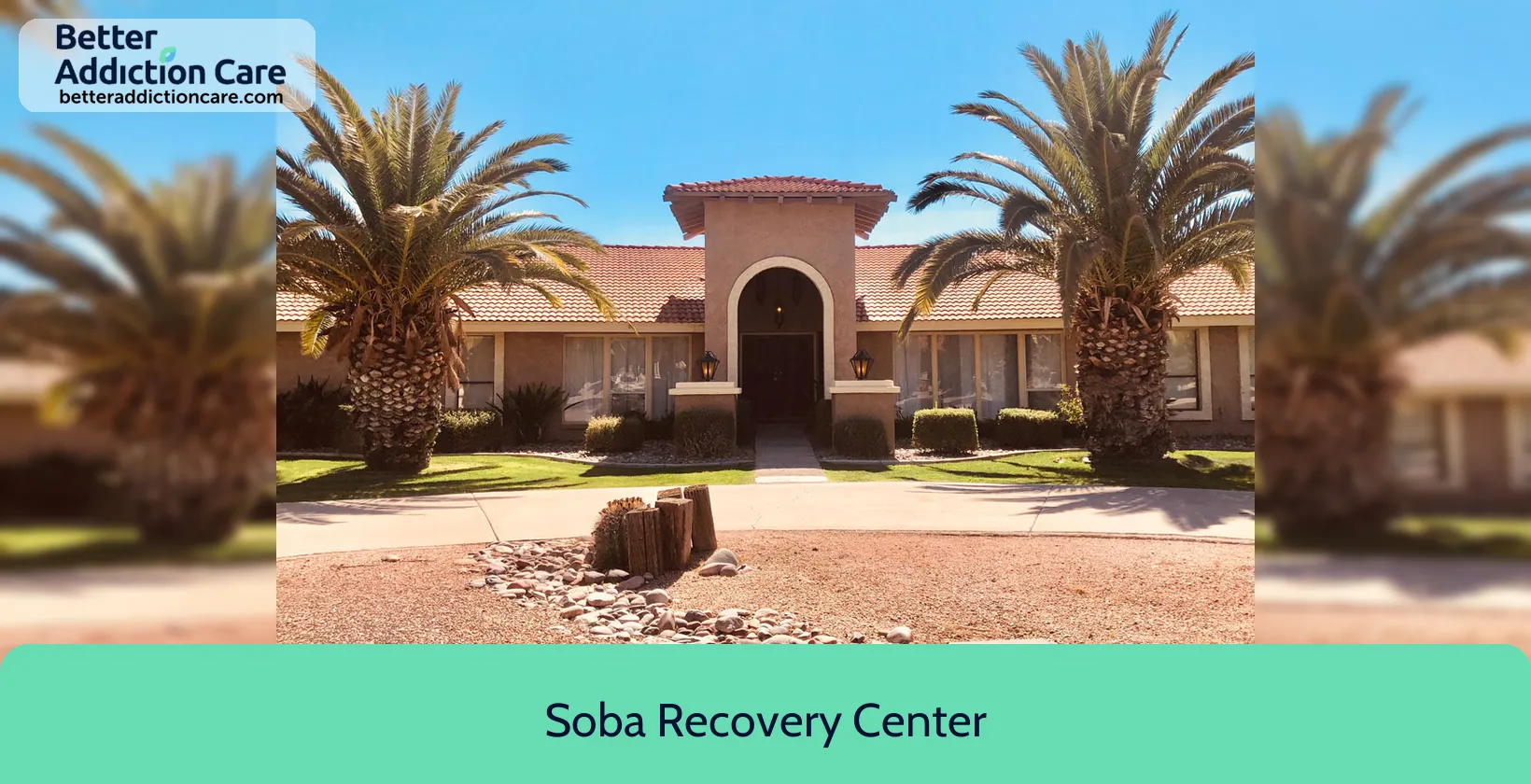
7.46
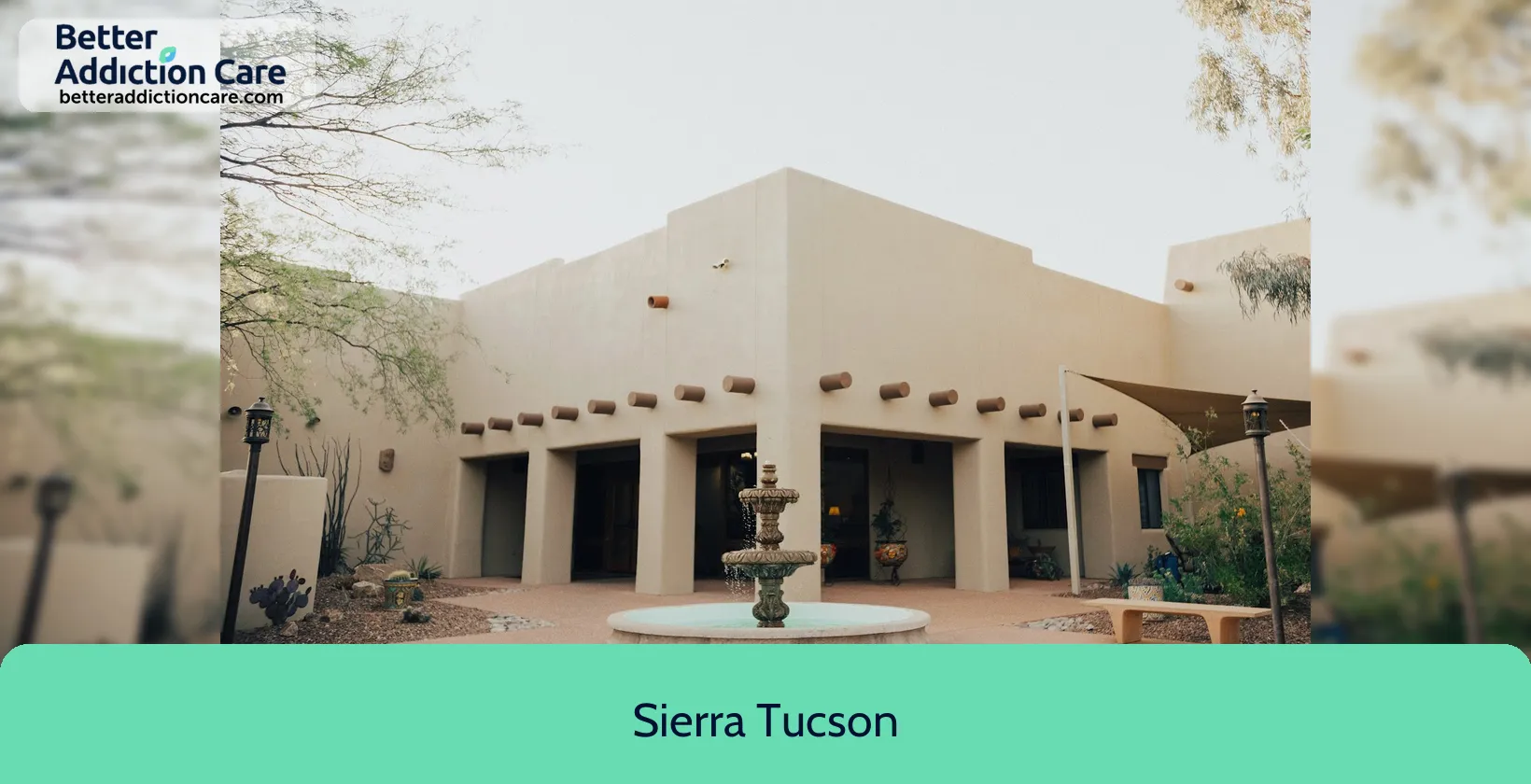
7.91
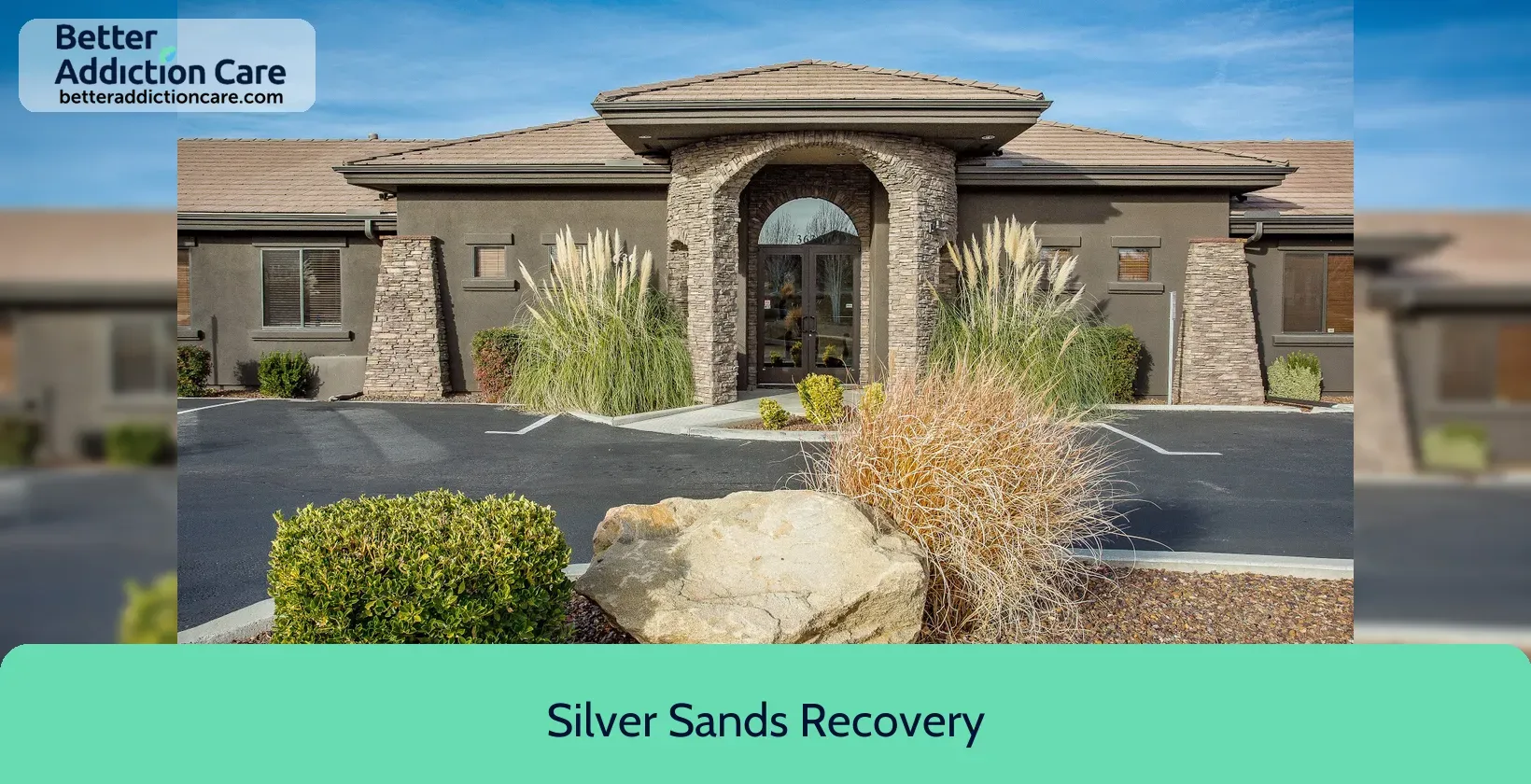
7.49
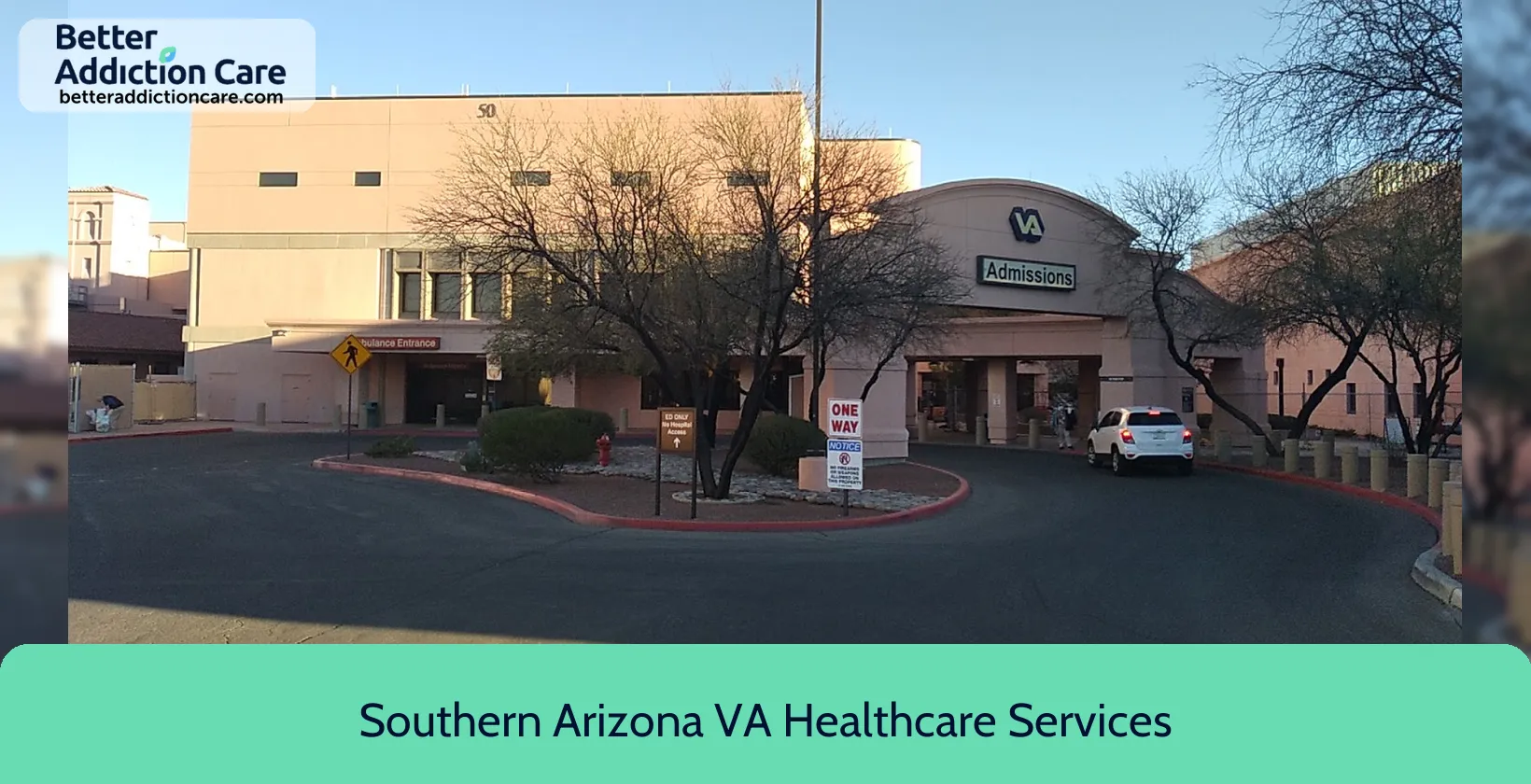
8.03

7.18
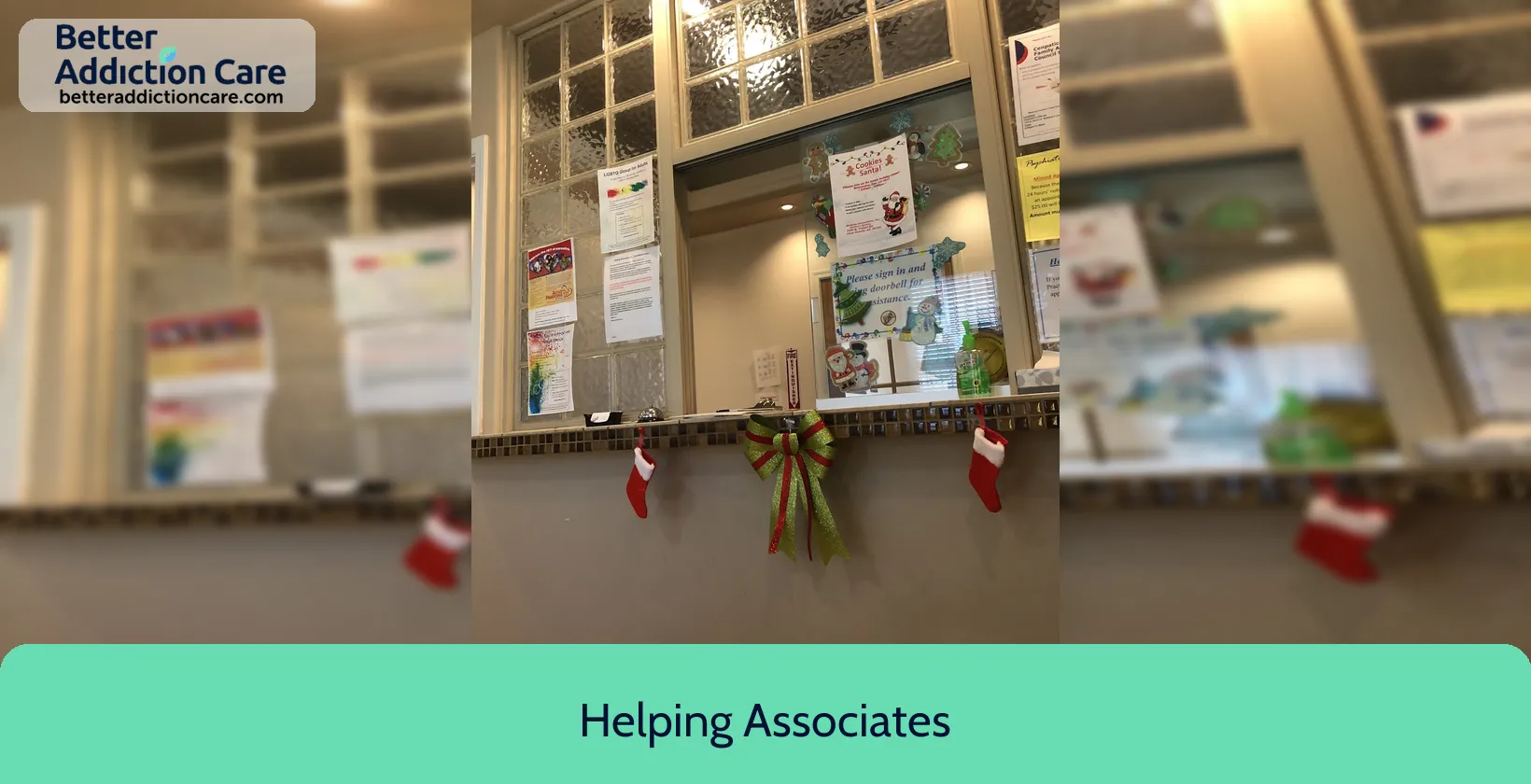
7.32
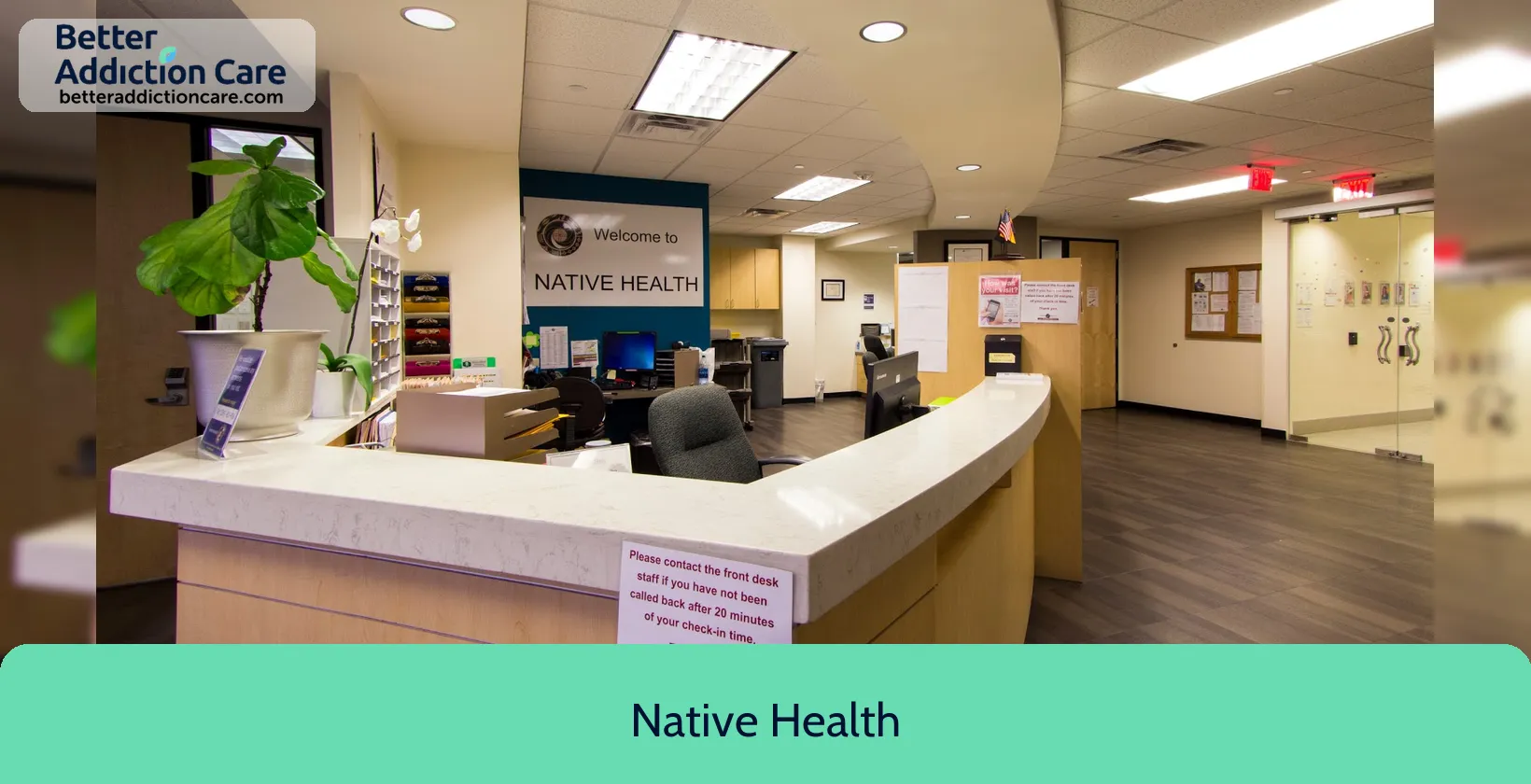
7.12
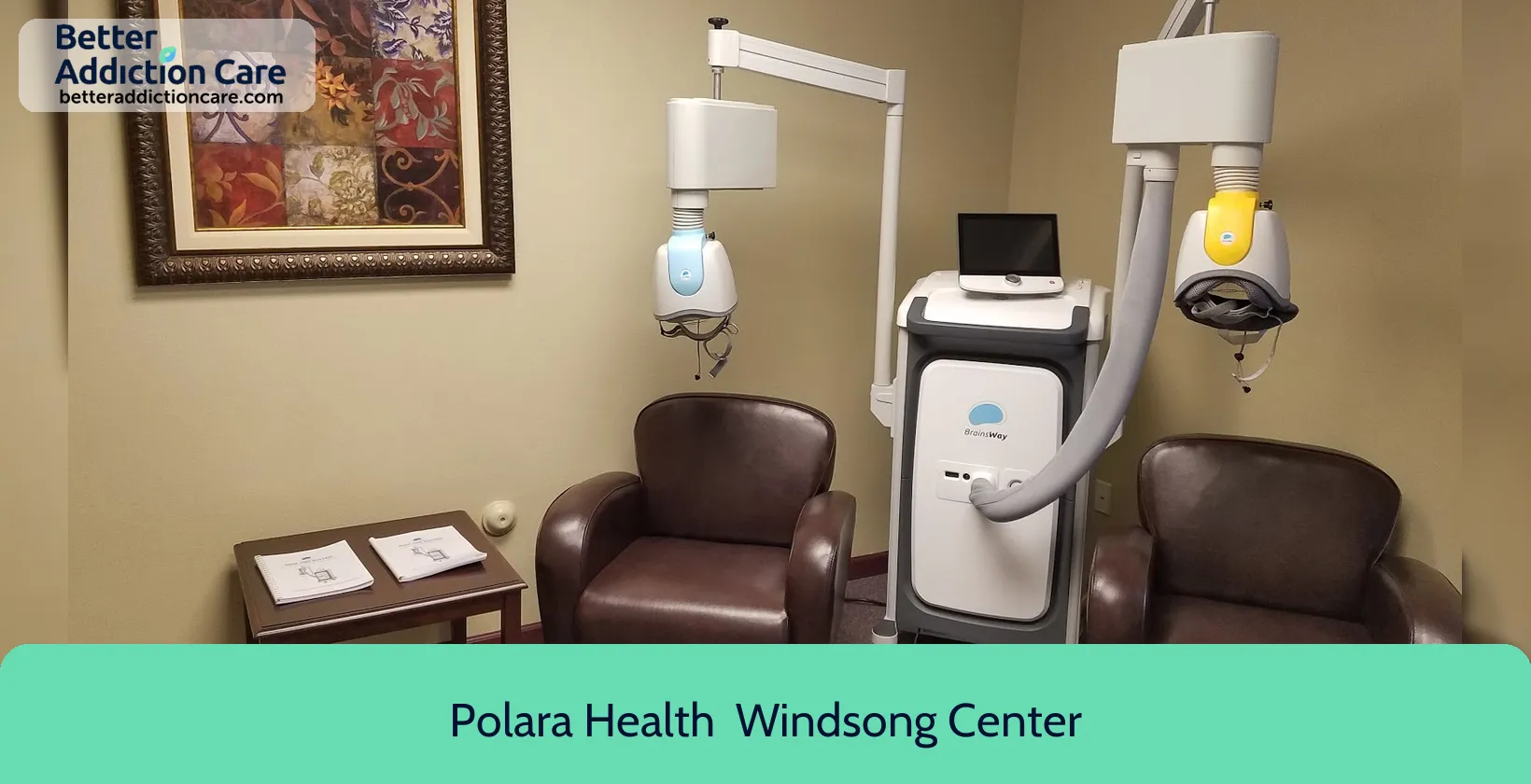
7.49

7.24
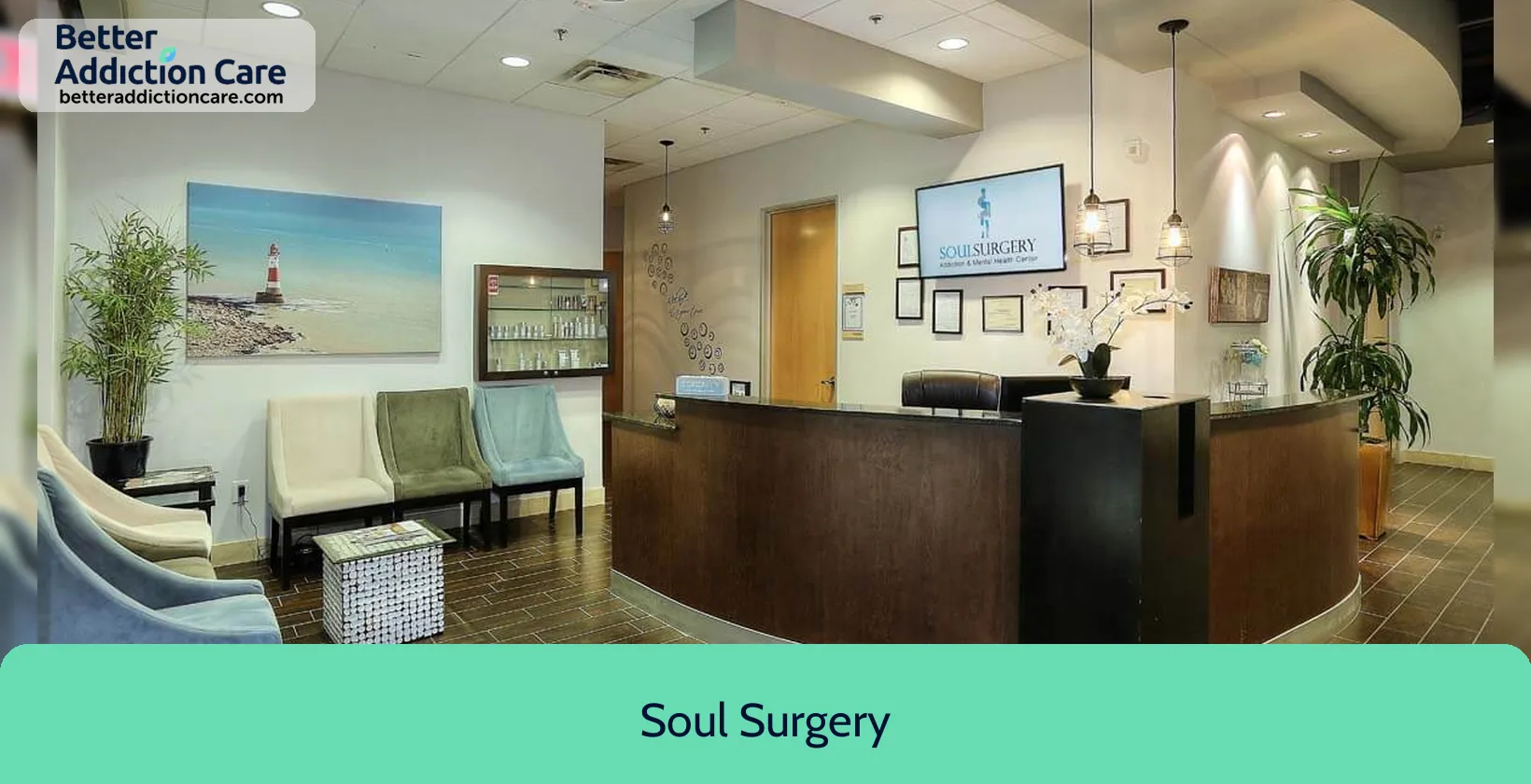
8.02
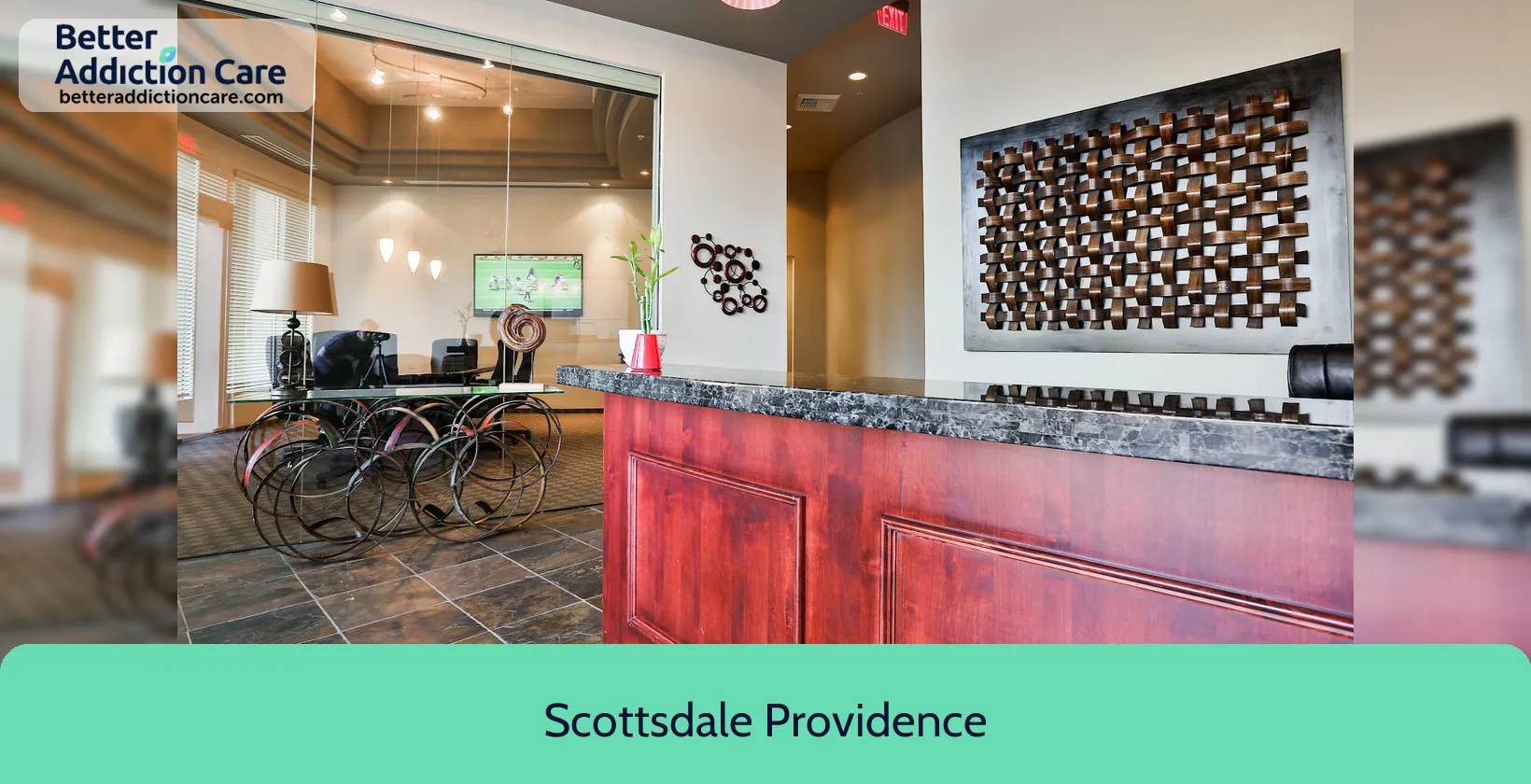
7.62

7.78
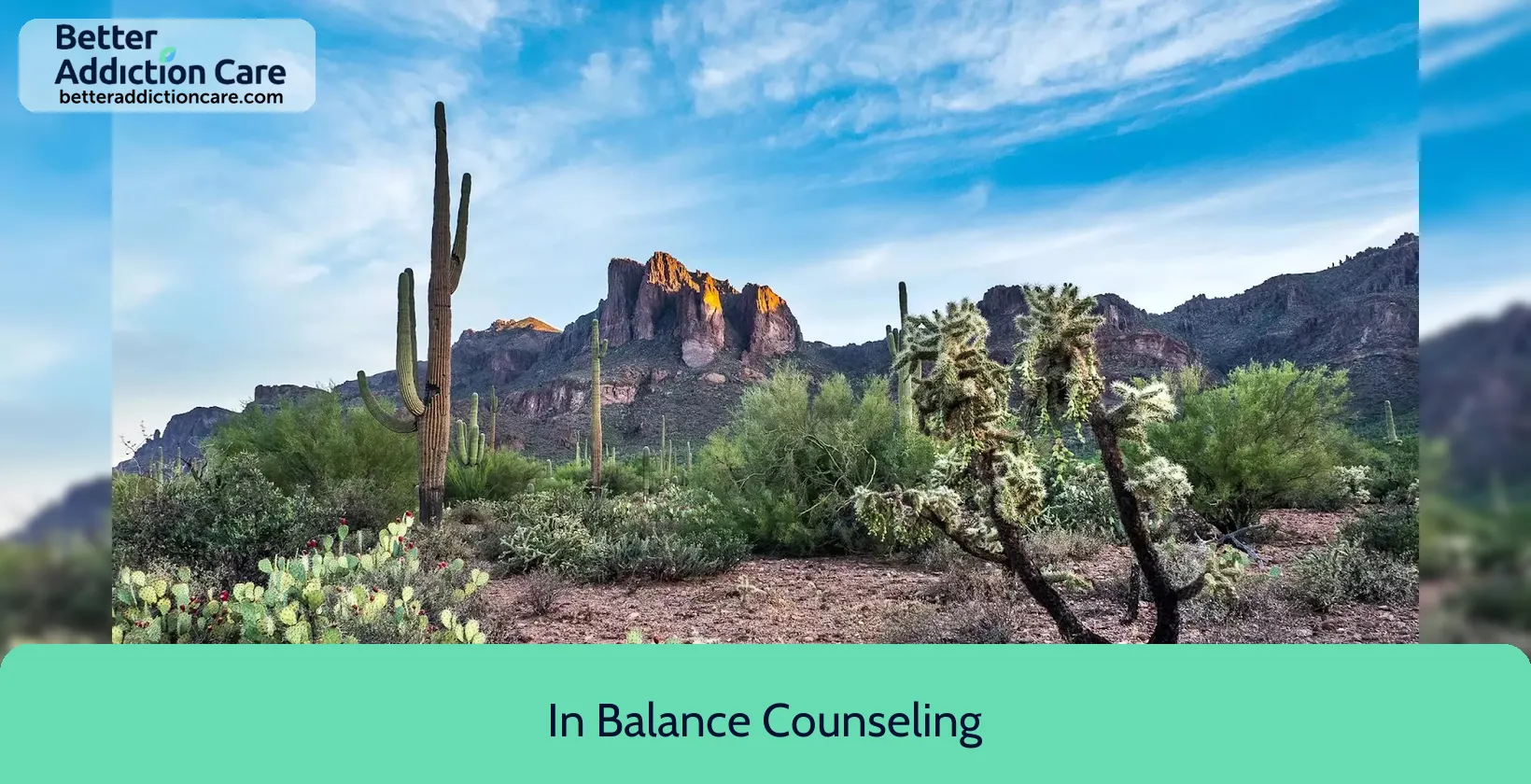
6.87
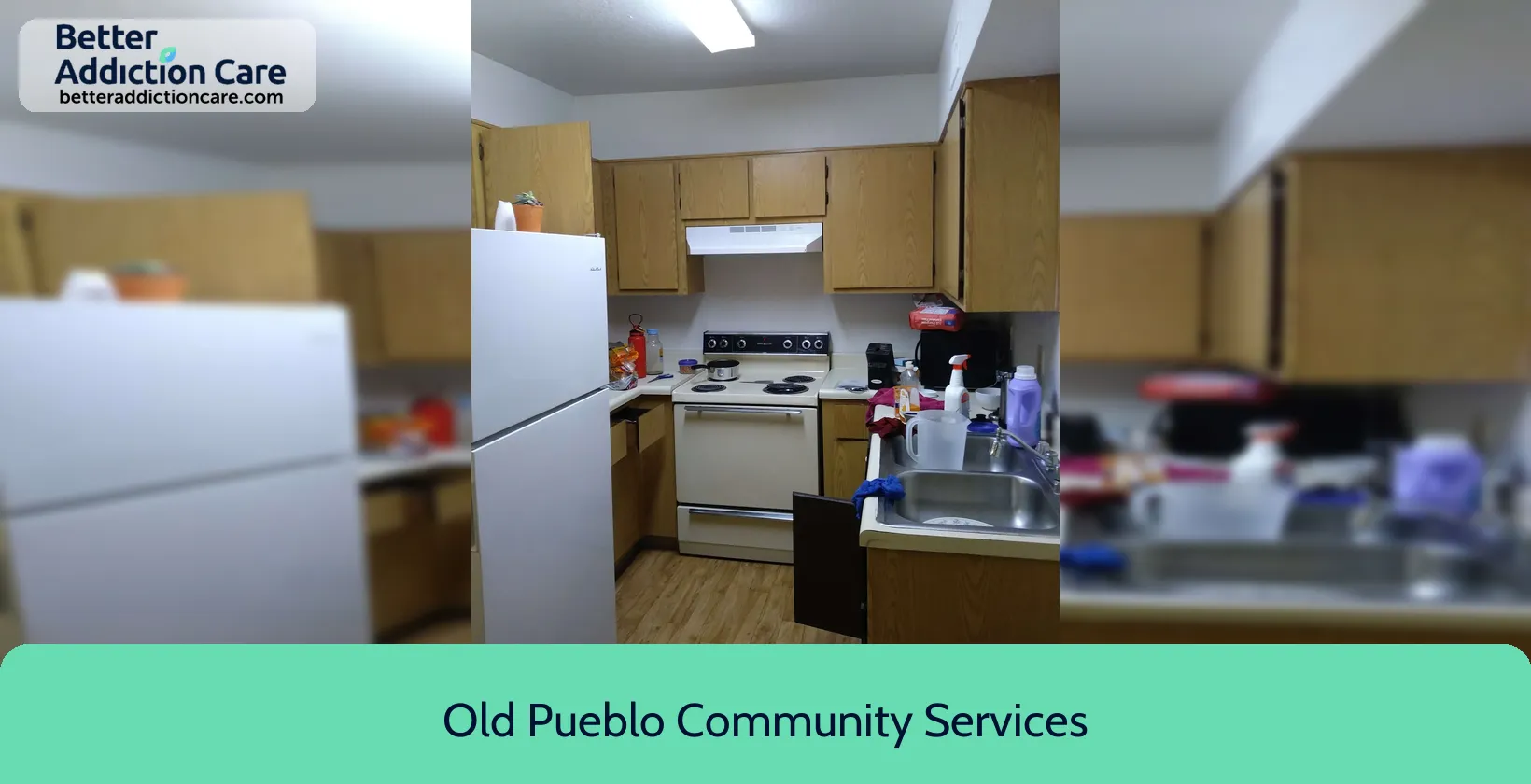
6.96
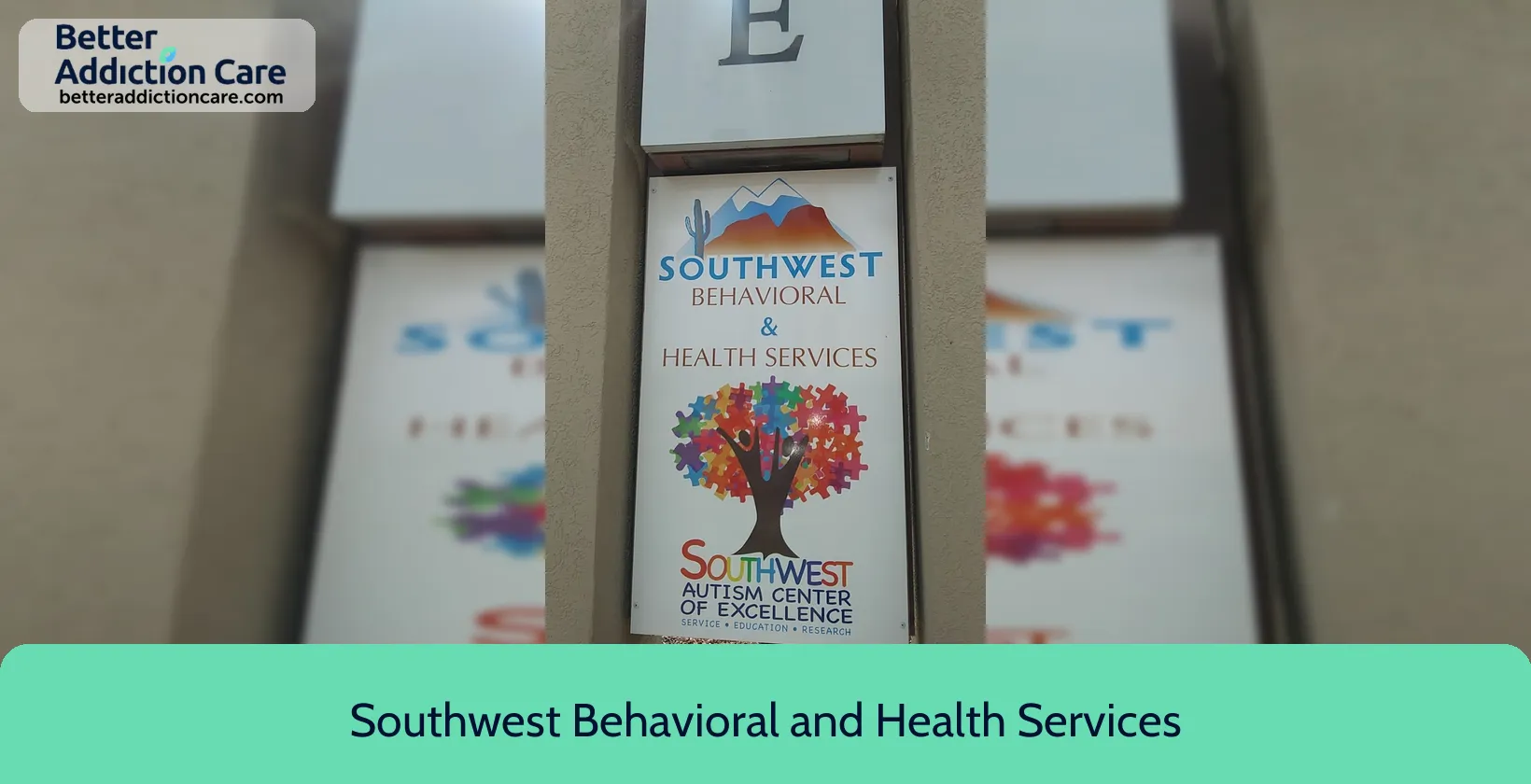
7.06

7.10

7.53
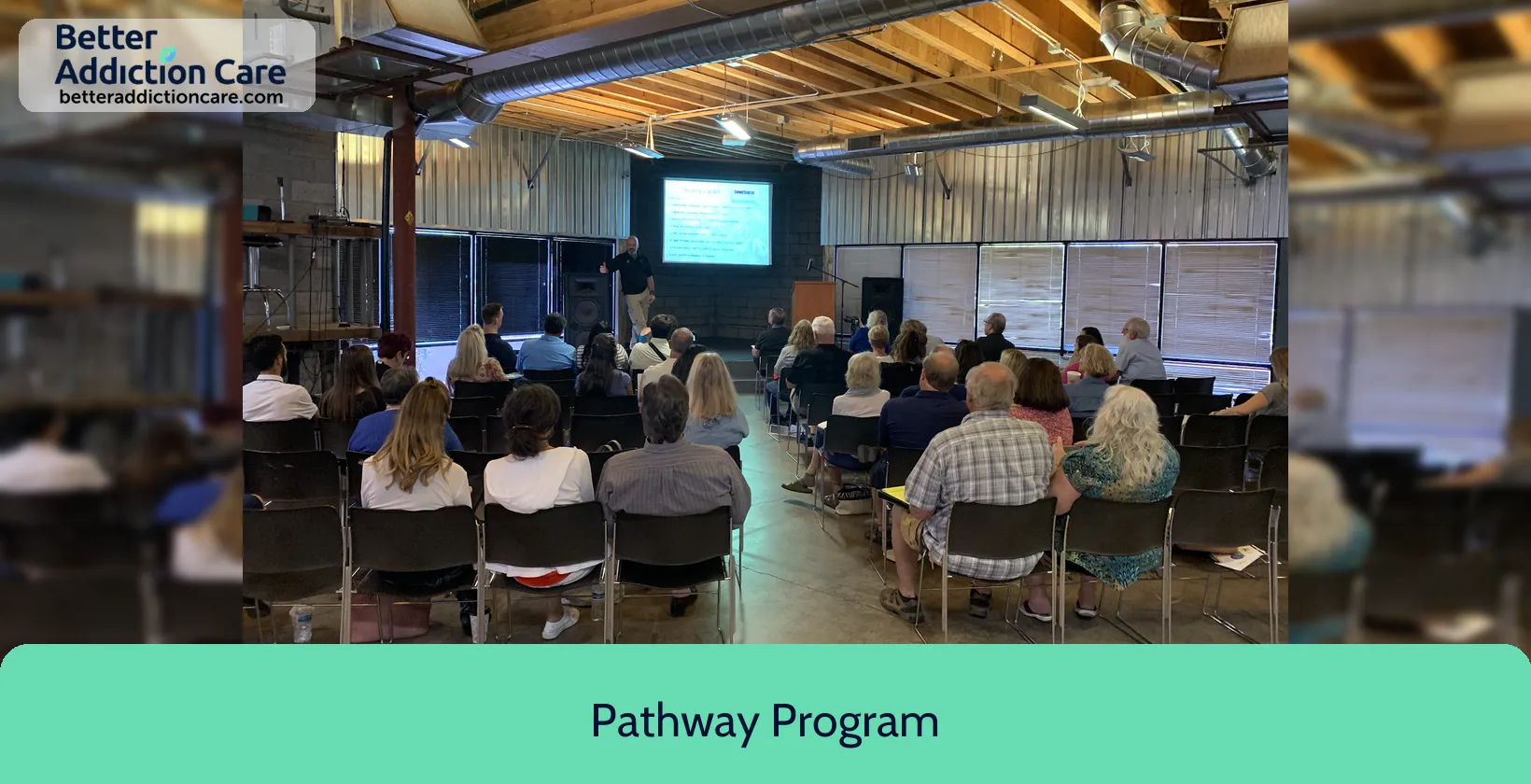
6.87
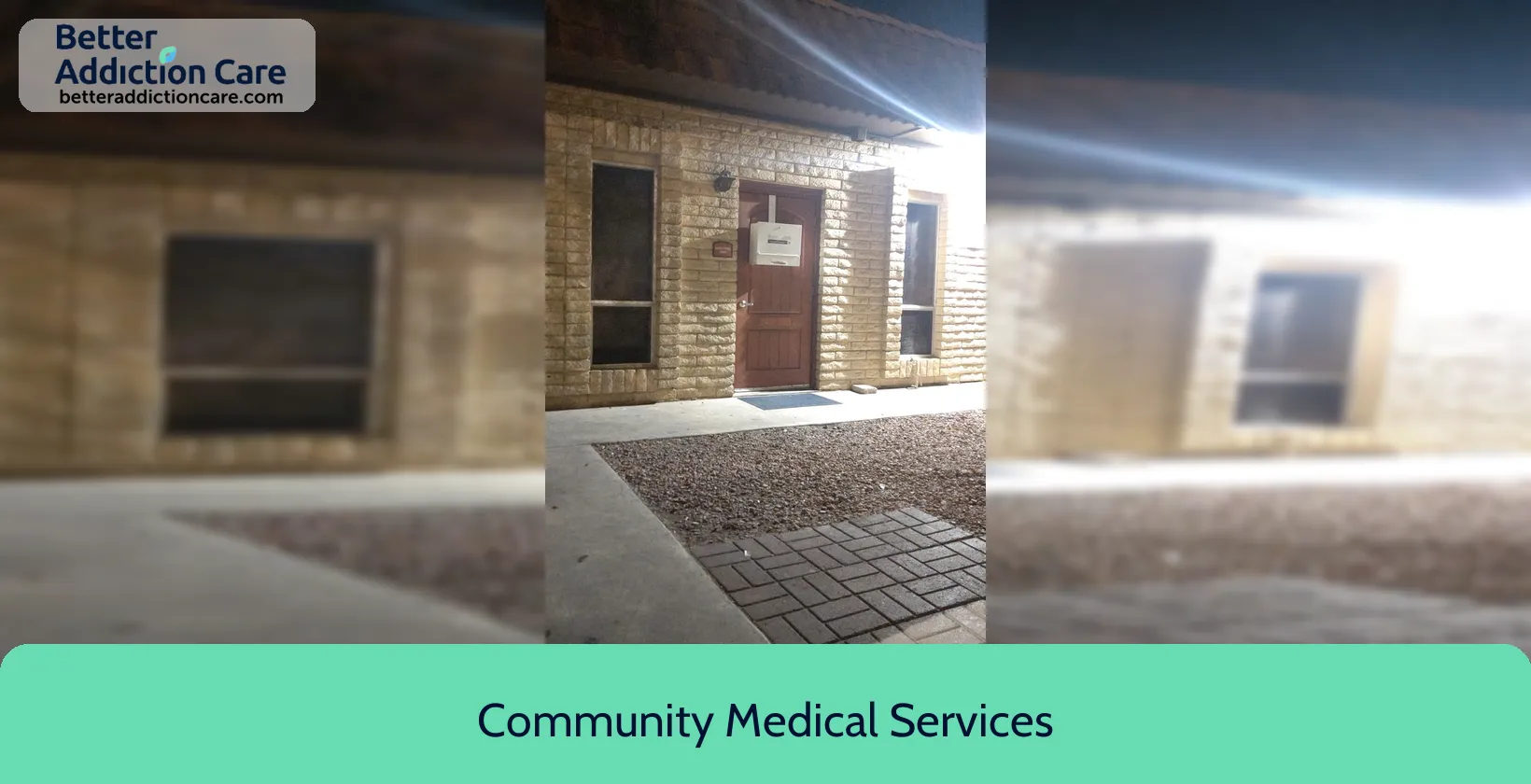
7.42

7.27
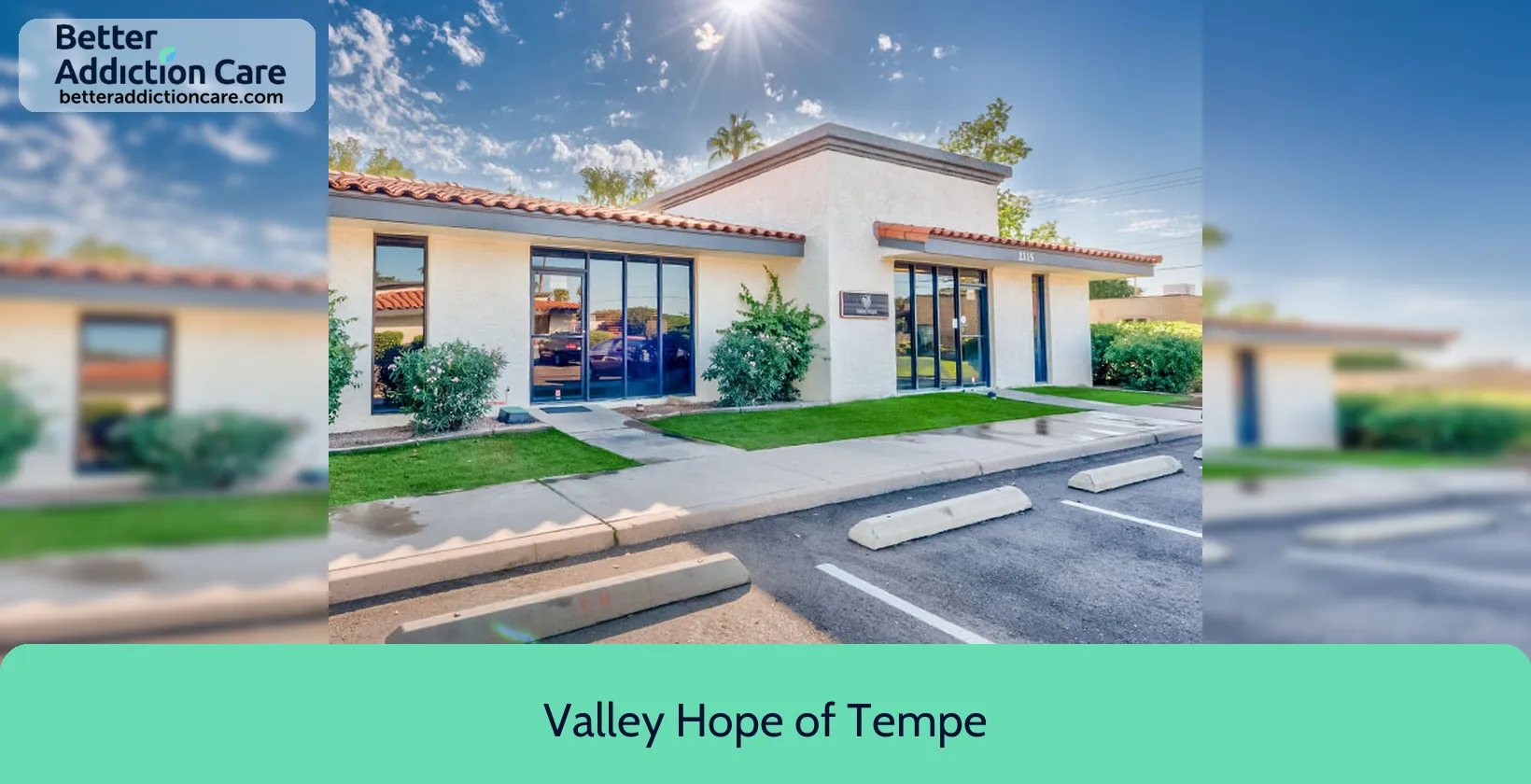
7.00
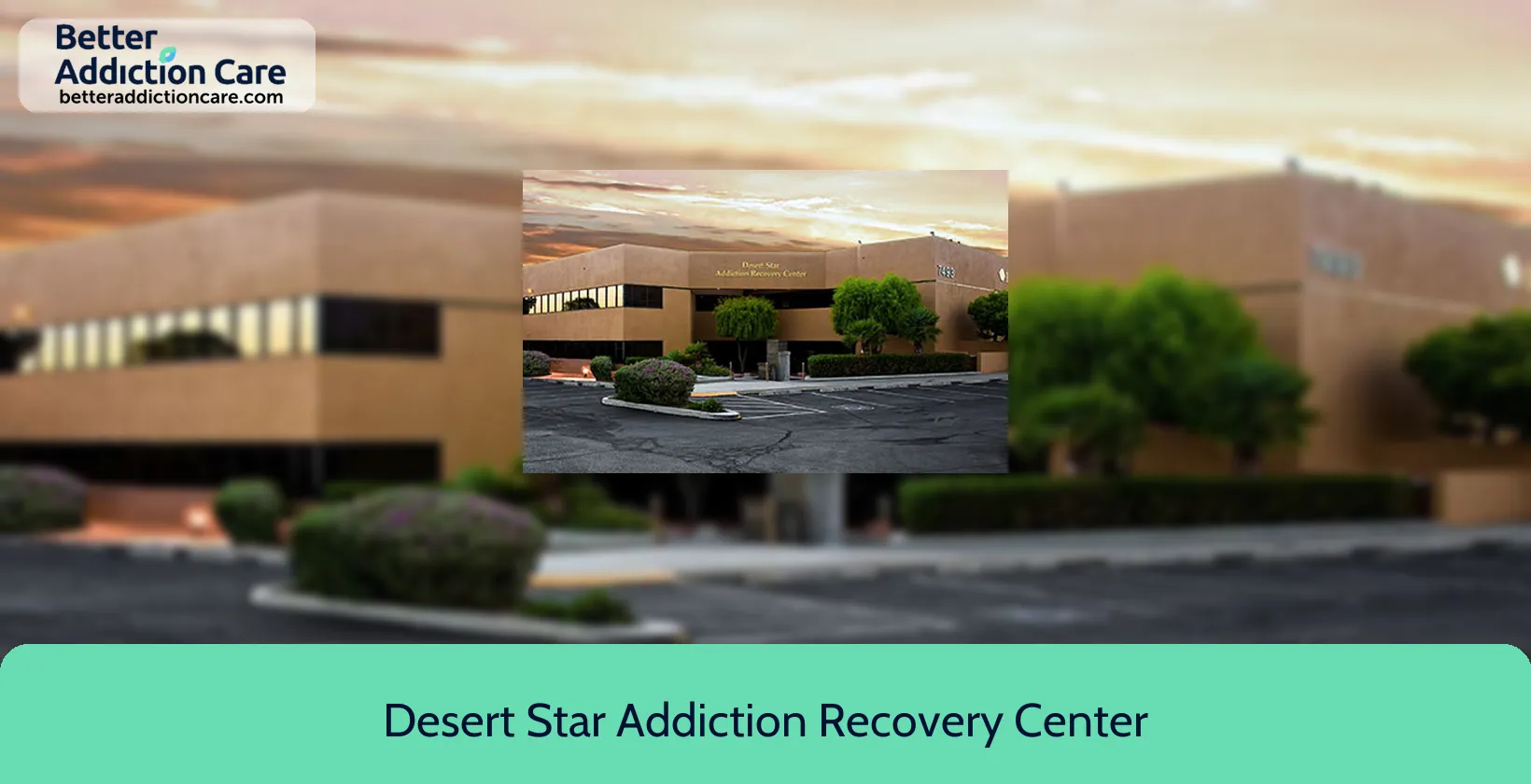
7.14
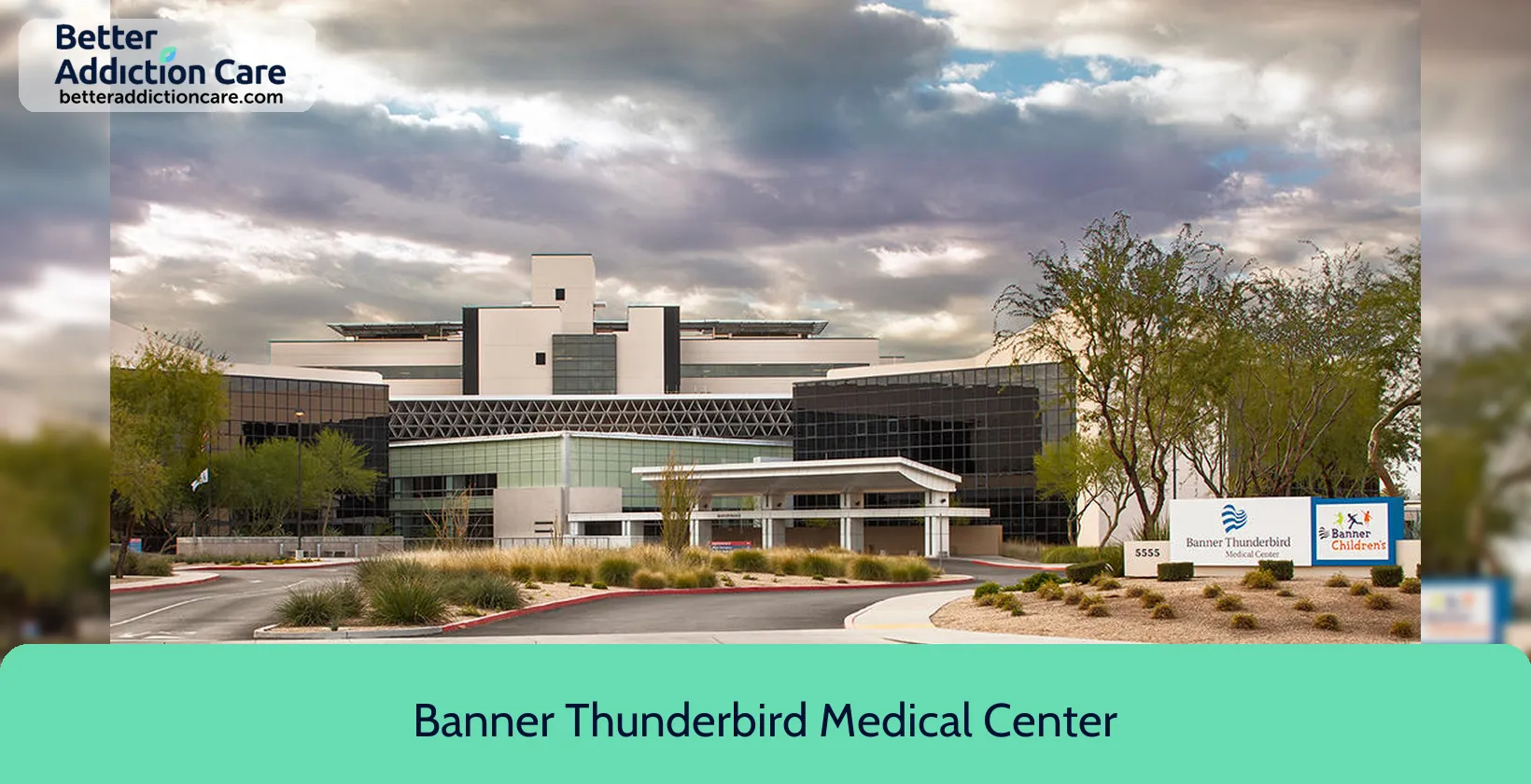
7.54
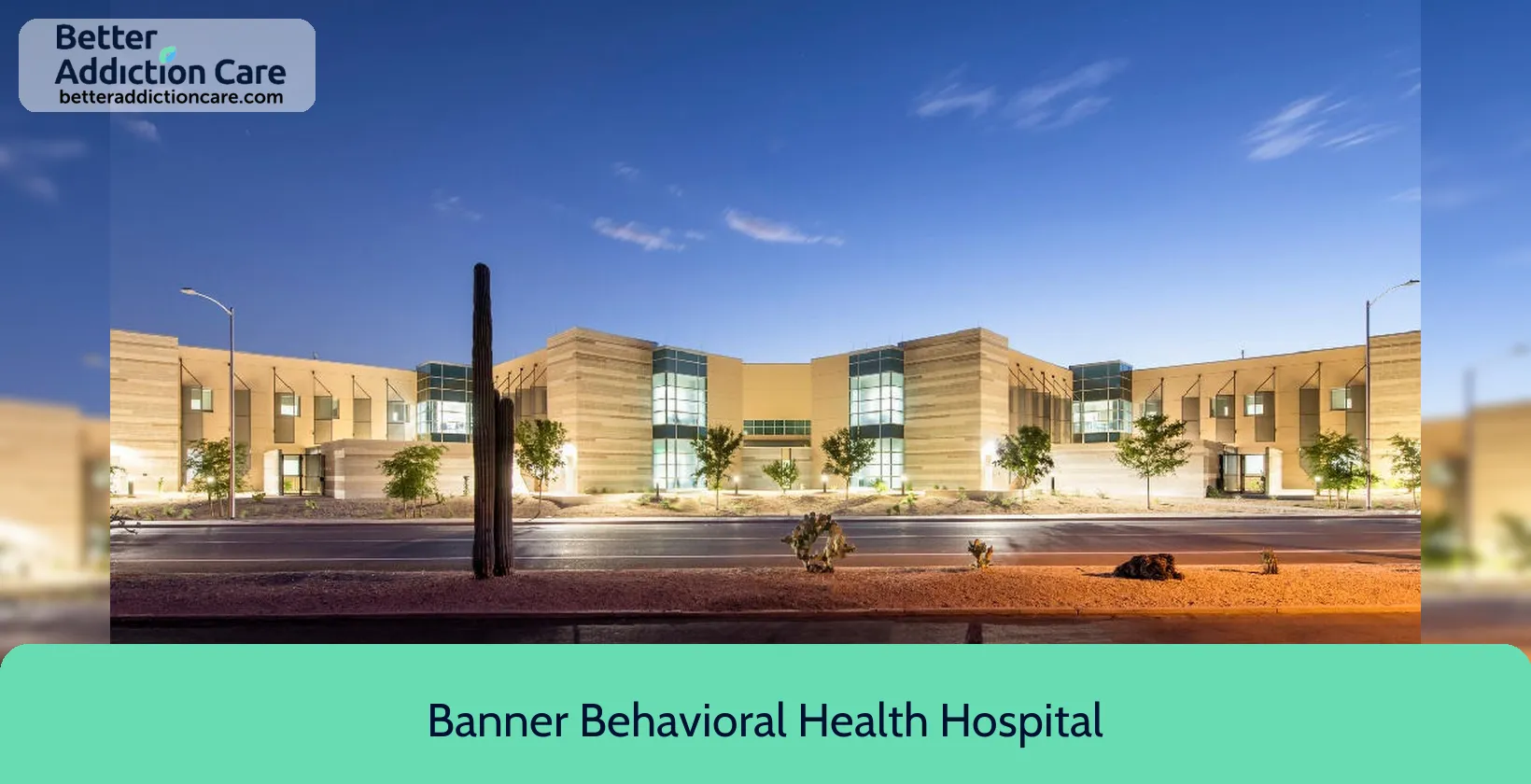
7.42

7.39

7.05
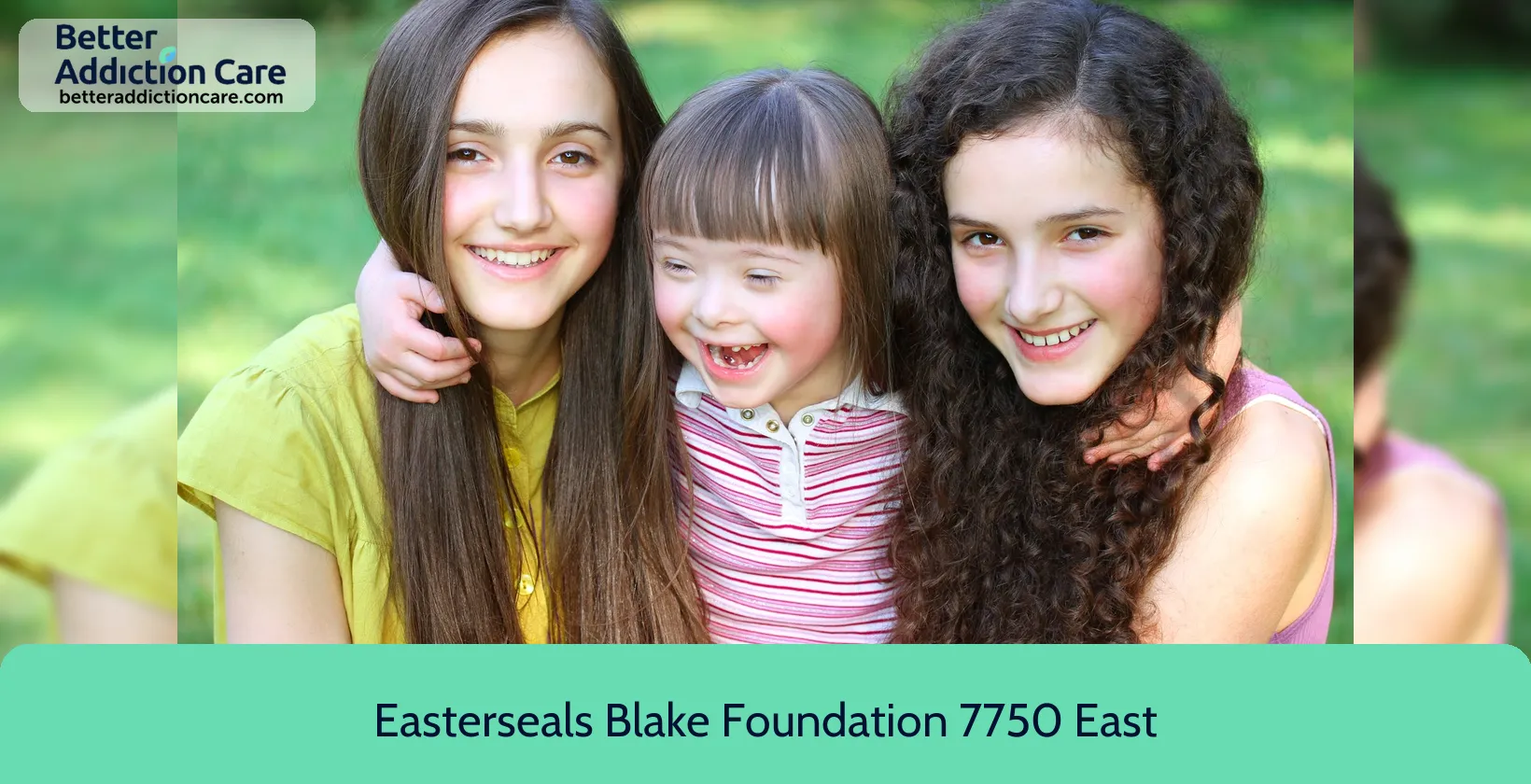
7.08
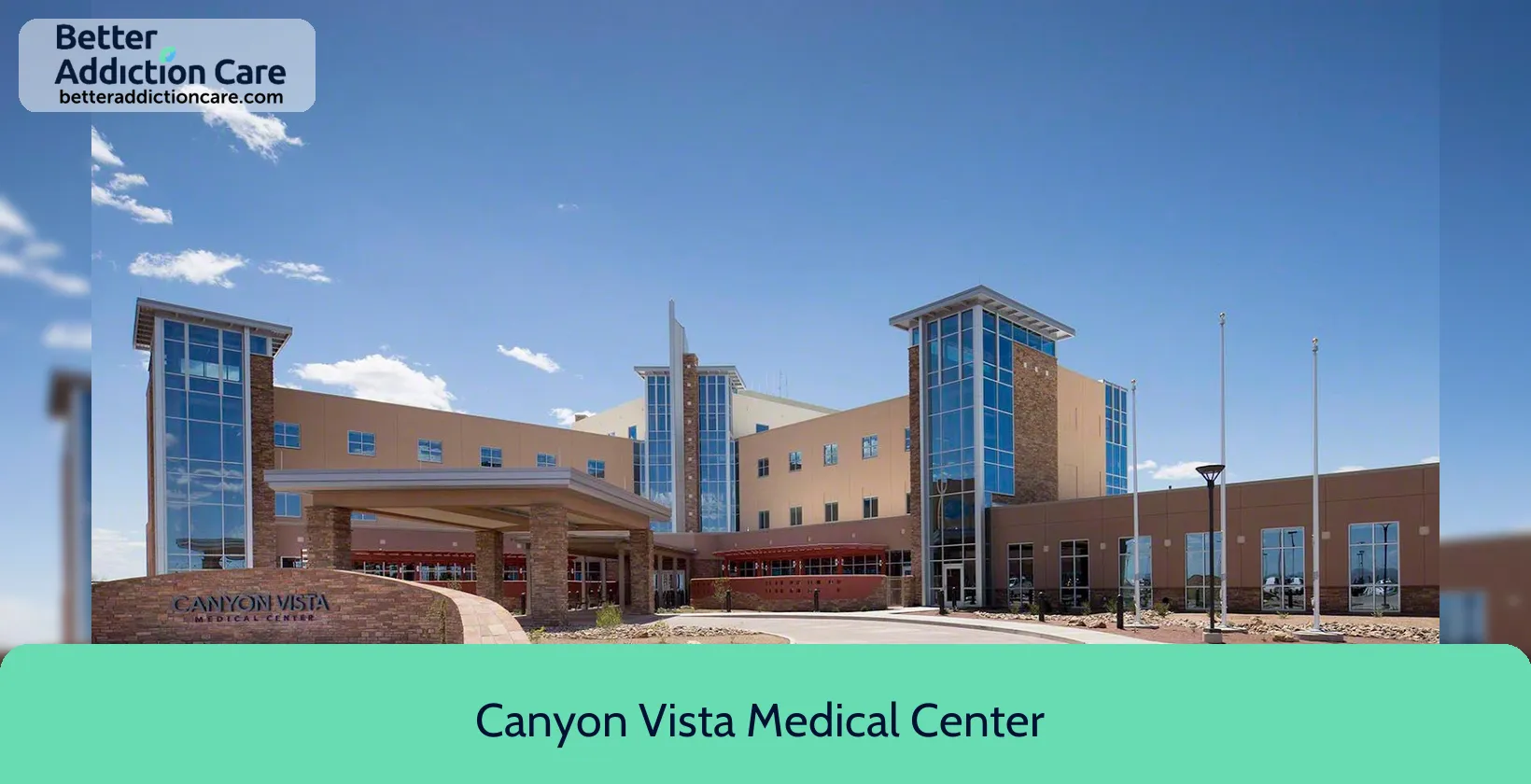
6.68
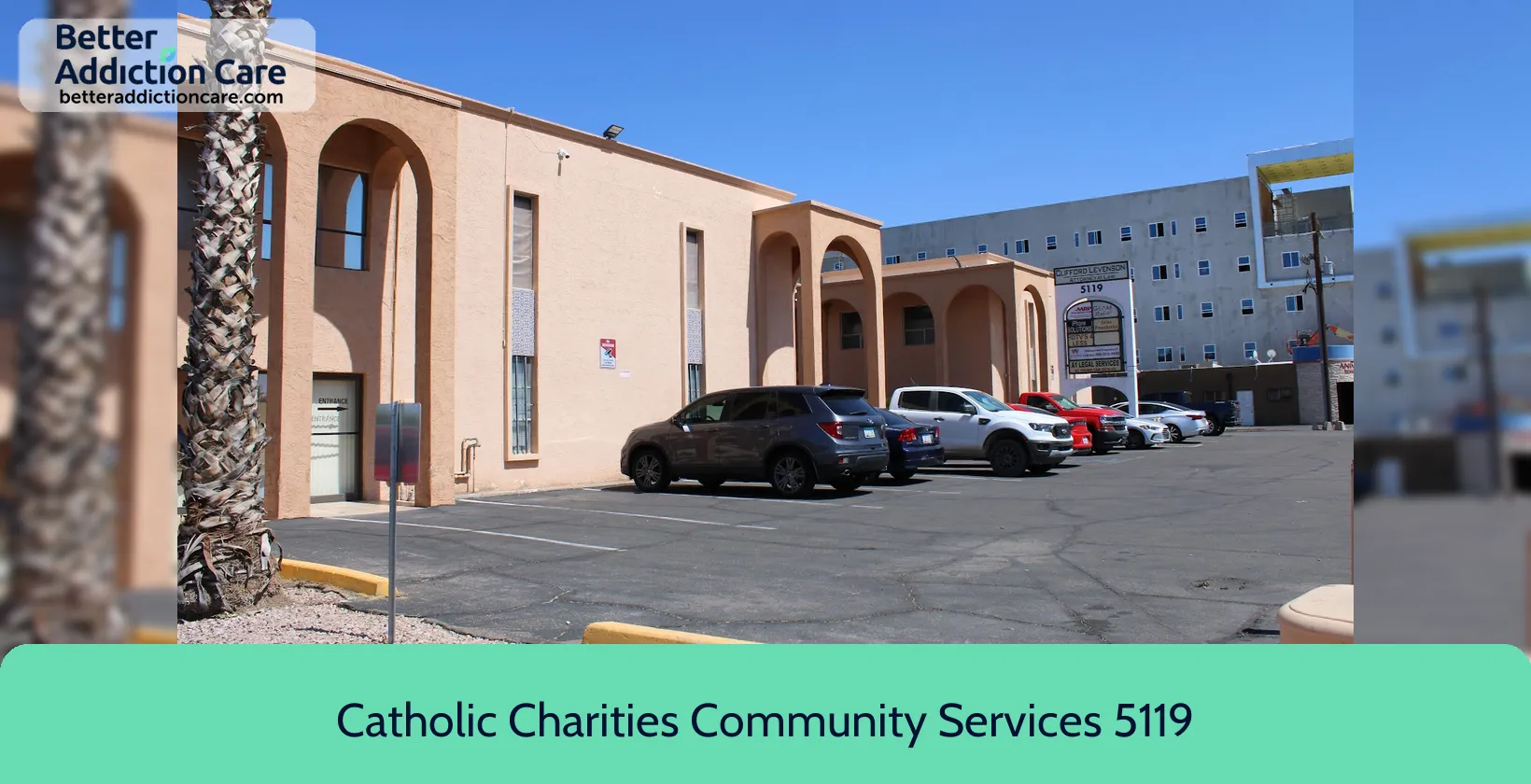
6.53
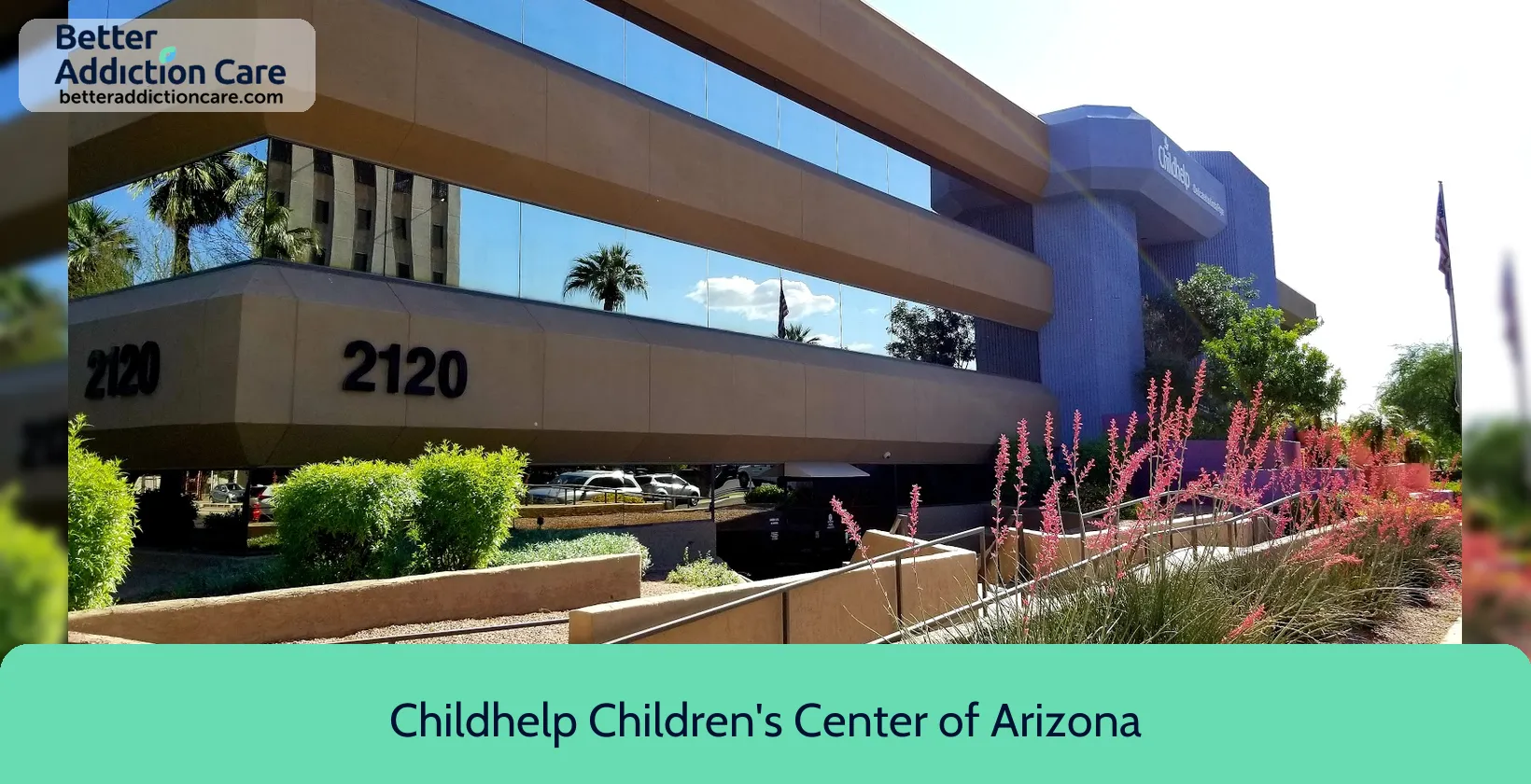
6.62
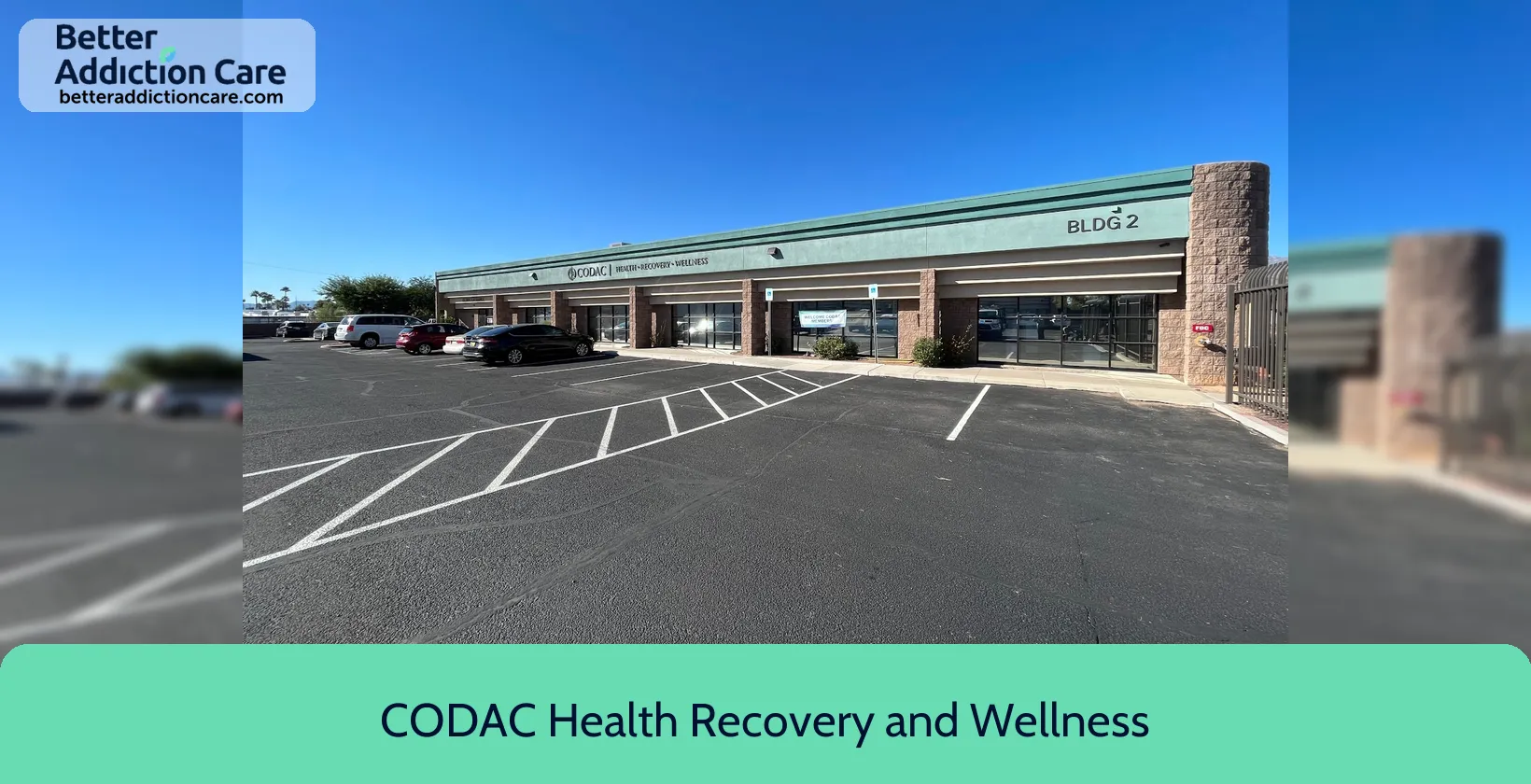
7.49
Substance abuse and Mental Health facilities Report for Arizona
31st
Cheapest To Most Expensive State Rank
493
Substance Abuse Facilities
79,399
Number of Patients Annually
76,765
Annual Enrollments
$131M
Spent on Outpatient Services (Million)
$1,706.00
Avg Outpatient Rehab Cost
2,102
Residential Admissions
$119M
Spent on Residential Treatment (Million)
$56,789.00
Residential Rehab Pay (Up To)
532
Total Patients
4
Free Drug Rehab Facilities
Alcoholism, Drug Abuse, Mental Health, and Treatment in Arizona
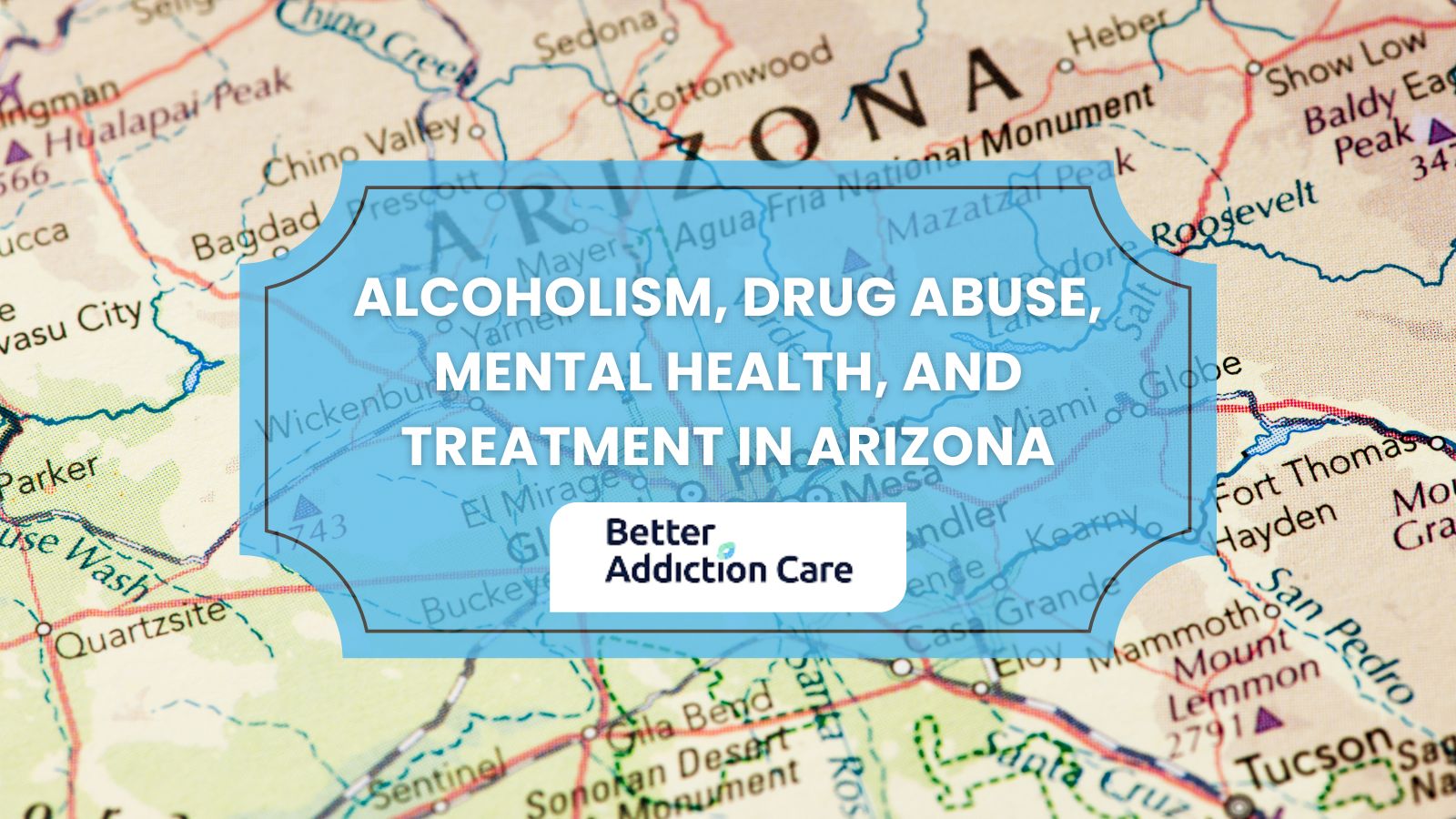
What are the main addictions people in Arizona suffer from?
The main addictions people in Arizona suffer from includes;
- Alcohol Addiction: The total affected population from Alcohol addiction is 754,000 individuals aged 12 and older, that is 10.5% of the population. Male are higher in number at 425,000 (56%) as compared to 329,000 (44%) females.
- Drug Addiction: The total affected population from Drug addiction is 660,000 individuals aged 12 and older, which translates to 9.2% of the population. Men are more affected with 366,000 that equates to (55%), and women 294,000 (45%) are affected with Drug Addiction.
- Opioid Addiction: 144,000 individuals aged 12 and older are affected with opioid addiction, that is 2% of the population. Men are highly affected with opioid addiction with 80,000 (56%) as compared to women 64,000 (44%).
- Marijuana Addiction: 1,575,000 individuals aged 12 and older are affected with Marijuana Addiction. It is 21.9% of the population. 875,000 (56%) reported using Marijuana, while 700,000 (44%) female encountered Marijuana Addiction
- Methamphetamine Addiction: 65,000 individuals aged 12 and older have faced Methamphetamine Addiction, which is 0.9% of the population. Men are more affected with 366,000 that equates to (55%), and women 294,000 (45%) are affected with Methamphetamine Addiction.
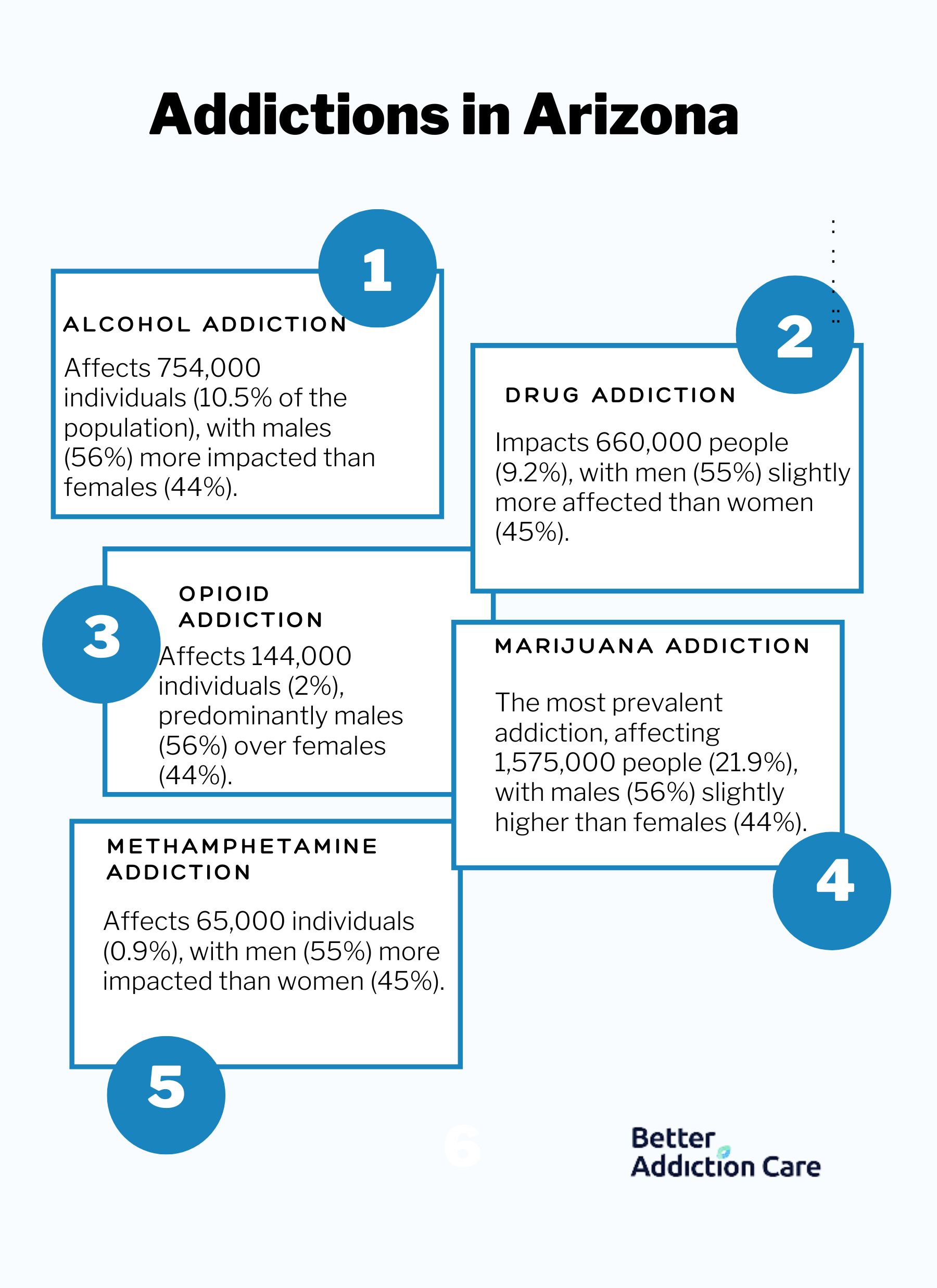
What is the cost of rehab centers in Arizona?
The cost of rehab centers in Arizona is $56,789, which equates to 73%. For a 30-day inpatient stay, the cost is $46,765 (50%). It is $630.99 per day without insurance coverage. With 60% insurance coverage, this reduces to $252.40 per day, and with 80% coverage, it further decreases to $126.20 per day. For a 30-day outpatient program, the cost is $12,060 (25%). It is $56.87 per day without insurance. With 60% insurance coverage, the daily cost is $22.75, and with 80% coverage, it's $11.37 per day.
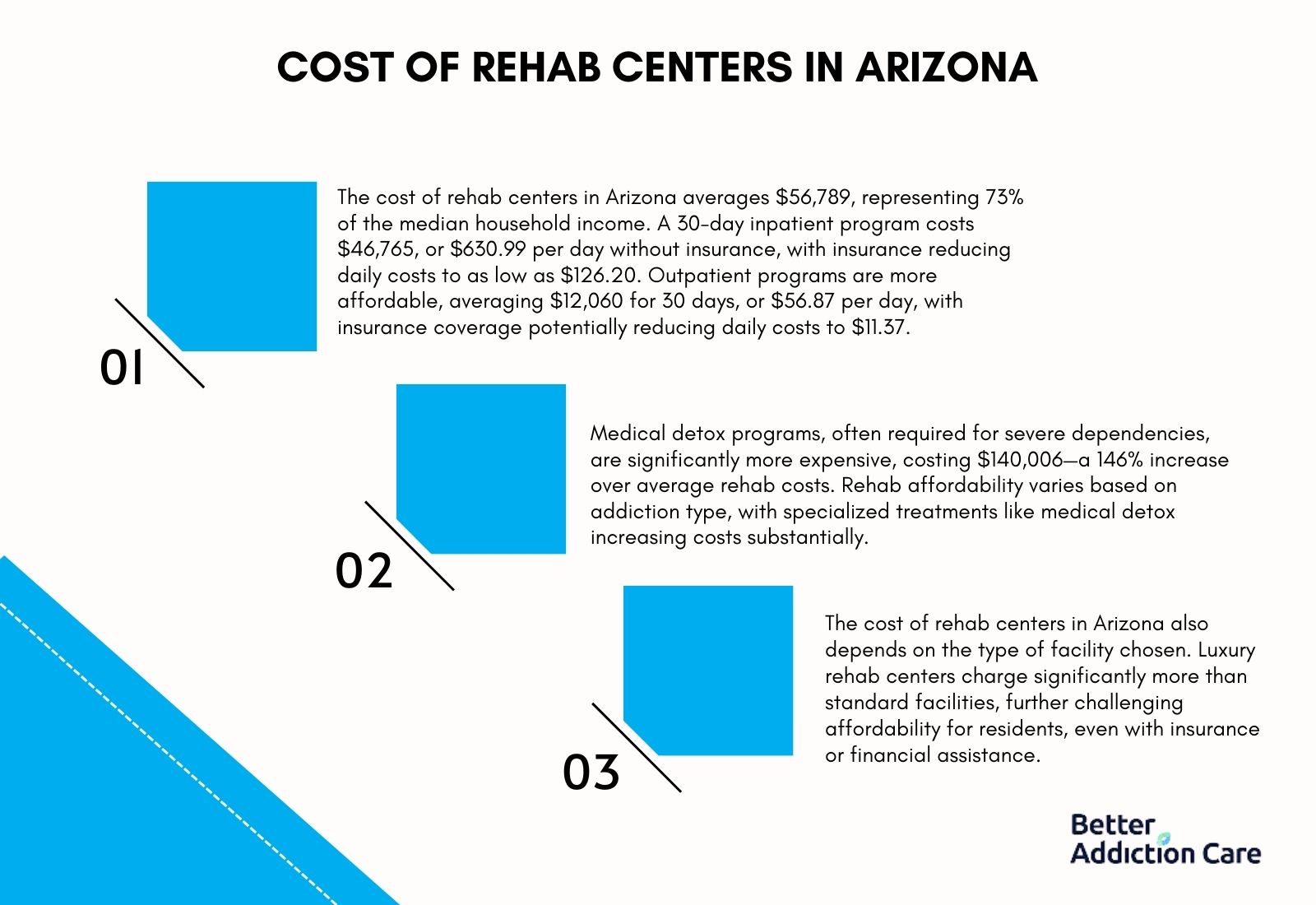
The cost of rehab centers in Arizona vary depending on factors such as the type of addiction being treated. For instance, medical detox programs, which are often necessary for severe substance dependencies, cost $140,006, representing an increase of $83,217 or 146% over the average rehab cost.
The cost of rehab centers in Arizona constitutes 73% of a household's annual income, since Arizona's median household income is $77,315, which indicates that rehab services are financially challenging for many residents. It's important to note that costs of rehab centers in Arizona also fluctuate based on the type of rehab center, with luxury facilities charging more than standard centers.
What is the cost of LGBTQ+ rehab centers in Arizona?
The cost of LGBTQ+ rehab centers in Arizona is $52,789, which equates to 69%. For a 30-day inpatient stay, the cost is $46,765 (50%). It is $630.99 per day without insurance coverage. With 60% insurance coverage, this reduces to $252.40 per day, and with 80% coverage, it further decreases to $126.20 per day. For a 30-day outpatient program, the cost is $12,060 (25%). It is $56.87 per day without insurance. With 60% insurance coverage, the daily cost is $22.75, and with 80% coverage, it's $11.37 per day.
The cost of LGBTQ+ rehab centers in Arizona vary depending on factors such as the type of addiction being treated. For instance, medical detox programs, which are often necessary for severe substance dependencies, cost $140,006, representing an increase of $83,217 or 146% over the average rehab cost.
The cost of LGBTQ+ rehab centers in Arizona constitutes 69% of a household's annual income, since Arizona's median household income is $77,315, which indicates that LGBTQ+ rehab centers in Arizona are financially challenging for many residents. Costs of LGBTQ+ rehab centers also fluctuate based on the type of rehab center, with luxury facilities charging more than standard centers.
What is the cost of Faith-Based rehab centers in Arizona?
The cost of Faith-Based rehab centers in Arizona is $50,789, which equates to 72.5%. For a 30-day inpatient program,the cost of Faith-Based rehab centers is $46,765 (50%), while for a 30-day outpatient program, the cost is $12,060 (25%). Faith-Based rehab centers offer programs at or below this average, depending on the facility and services provided.
The type of addiction being treated influences the cost. For example, medical detox programs, often necessary for severe substance dependencies, cost $140,006, representing an increase of $83,217 or 146% over the average rehab cost
The cost of Faith-Based rehab centers in Arizona constitutes 72.5% of a household's annual income, since Arizona's median household income is $77,315, which indicates that Faith-Based rehab centers in Arizona are financially challenging for many residents. Costs of Faith-Based rehab centers also fluctuate based on the type of rehab center, with luxury facilities charging more than standard centers.
What is the cost of Men-Only rehab centers in Arizona?
The cost of Men-Only rehab centers in Arizona is $56,789, which equates to 73%. For a 30-day inpatient stay, the cost is $46,765 (50%). It is $630.99 per day without insurance coverage. With 60% insurance coverage, this reduces to $252.40 per day, and with 80% coverage, it further decreases to $126.20 per day. For a 30-day outpatient program, the cost is $12,060 (25%). It is $56.87 per day without insurance. With 60% insurance coverage, the daily cost is $22.75, and with 80% coverage, it's $11.37 per day.
The cost of Men-Only rehab centers in Arizona vary depending on factors such as the type of addiction being treated. For instance, medical detox programs, which are often necessary for severe substance dependencies, cost $140,006, representing an increase of $83,217 or 146% over the average rehab cost.
The cost of Men-Only rehab centers in Arizona constitutes 73% of a household's annual income, since Arizona's median household income is $77,315, which indicates that Men-Only rehab services are financially challenging for many residents. Costs of Men-Only rehab centers also fluctuate based on the type of rehab center, with luxury facilities charging more than standard centers.
What is the cost of Women-Only rehab centers in Arizona?
The cost of Women-Only rehab centers in Arizona is $44,789, which equates to 60.5%. For a 30-day inpatient program, the cost of Faith-Based rehab centers is $40,765 (40%), while for a 30-day outpatient program, the cost is $9,060 (20%). Women-Only rehab centers offer programs at or below this average, depending on the facility and services provided.
The type of addiction being treated influences the cost. For example, medical detox programs, often necessary for severe substance dependencies, cost $140,006, representing an increase of $83,217 or 146% over the average rehab cost
The cost of Women-Only rehab centers in Arizona constitutes 60.5% of a household's annual income, since Arizona's median household income is $77,315, which indicates that Women-Only centers in Arizona are financially challenging for many residents. The costs also fluctuate based on the type of rehab center, with luxury facilities charging more than standard centers.
What is the cost of Teen Rehab centers in Arizona?
The cost of Teen rehab centers in Arizona is $48,789, which equates to 67.5%. For a 30-day inpatient program, the cost of Faith-Based rehab centers is $45,765 (47%), while for a 30-day outpatient program, the cost is $11,060 (24.9%). Teen rehab centers offer programs at or below this average, depending on the facility and services provided. The type of addiction being treated influences the cost. For example, medical detox programs, often necessary for severe substance dependencies, cost $140,006, representing an increase of $83,217 or 146% over the average rehab cost.
The cost of Women-Only rehab centers in Arizona constitutes 67.5% of a household's annual income, since Arizona's median household income is $77,315, which indicates that accessing Teen rehab services is financially burdensome for many households in the state of Arizona. The costs of Women-Only rehab centers also fluctuate based on the type of rehab center, with luxury facilities charging more than standard centers.
What is the cost of Young Adult rehab centers in Arizona?
The cost of Young Adult rehab centers in Arizona is $55,789, which equates to 73%. For a 30-day inpatient program, the cost of Young Adult rehab centers is $46,765 (50%), while for a 30-day outpatient program, the cost is $12,060 (25%).
Young Adult rehab centers offer programs at or below this average, depending on the facility and services provided. The type of addiction being treated influences the cost. For example, medical detox programs, often necessary for severe substance dependencies, cost $140,006, representing an increase of $83,217 or 146% over the average rehab cost.
The cost of Young Adult rehab centers in Arizona constitutes 73% of a household's annual income, since Arizona's median household income is $77,315, which indicates that accessing Young Adult services is financially burdensome for many households in the state of Arizona. Costs of Young Adult rehab centers also fluctuate based on the type of rehab center, with luxury facilities charging more than standard centers.
What is the cost of Luxury Rehab centers in Arizona?
The cost of a Luxury Rehab center in Arizona is $120,000, which is $63,211 more than the average, representing an increase of 111%. The average cost for a 30-day program at a luxury rehab center in Arizona ranges from $30,000 to $120,000 (110%). Luxury rehab centers in Arizona offer high-end amenities and personalized care, leading to higher costs compared to standard facilities.
Arizona's median household income is $77,315. A luxury rehab center in Arizona costing $120,000 constitutes 155% of the annual median household income. Luxury Rehab centers in Arizona offering exclusive services like private rooms, gourmet meals, spa treatments, and holistic therapies tend to charge more.
What is the cost of Dual Diagnosis rehab centers in Arizona?
The cost of Dual Diagnosis rehab centers in Arizona is $56,789, which equates to 73%. For a 30-day inpatient stay, the cost is $46,765 (50%). It is $630.99 per day without insurance coverage. With 60% insurance coverage, this reduces to $252.40 per day, and with 80% coverage, it further decreases to $126.20 per day. For a 30-day outpatient program, the cost is $12,060 (25%). It is $56.87 per day without insurance. With 60% insurance coverage, the daily cost is $22.75, and with 80% coverage, it's $11.37 per day.
The cost of Dual Diagnosis rehab centers in Arizona vary depending on factors such as the type of addiction being treated. For instance, medical detox programs, which are often necessary for severe substance dependencies, cost $140,006, representing an increase of $83,217 or 146% over the average rehab cost.
The cost of Dual Diagnosis rehab centers in Arizona constitutes 73% of a household's annual income, since Arizona's median household income is $77,315, which indicates that Dual Diagnosis rehab services are financially challenging for many residents. Costs also fluctuate based on the type of rehab center, with luxury facilities charging more than standard centers.
Is drug abuse and addiction a problem in Arizona?
Yes, drug abuse and addiction is a problem in Arizona. The state of Arizona has faced a notable rise in drug overdose deaths, with a 56% increase since 2019 and a 99% rise since 2023, putting Arizona above the national average in 2024. The opioid crisis continues to heavily impact the state of Arizona, with nearly 2,000 opioid-related overdose deaths reported in 2024. Methamphetamine use is particularly widespread, with 36% of people indicating that at least one family member used methamphetamine recently.
Drug abuse and addiction among the youth is also concerning, as 6.7% of individuals aged 12-17 reported alcohol consumption in the past month, and 30.5% of those aged 18-25 reported having an alcohol use disorder. While various initiatives of Arizona have aimed to reduce substance abuse, Arizona continues to face challenges, especially with the increasing use of synthetic opioids and methamphetamines. The rising overdose death rates underscore the ongoing severity of the issue.
Is alcoholism a problem in Arizona?
Yes, alcoholism is a problem in Arizona. 49.44% of adults over 18 reported alcohol use in the past month, with 22.36% engaging in binge drinking during that period.
The state of Arizona has a higher alcohol-related death rate than the national average, with 19.7 deaths per 100,000 people in 2024 compared to the national rate of 13.1. Underage drinking is also prevalent; 15.89% of individuals aged 12-20 reported alcohol use in the past month, and 7.90% engaged in binge drinking.
Over the years, Arizona has seen fluctuations in alcohol consumption patterns, with recent data indicating a rise in alcohol-related health issues and fatalities, highlighting the ongoing challenges the state of Arizona faces in addressing alcoholism.
Is Mental Health a problem in Arizona?
Yes, mental health is a problem in Arizona. The state of Arizona ranks 49th in the nation for adult mental health care access, indicating a high prevalence of mental illness and limited access to treatment. 1,030,000 adults in Arizona have a mental health condition, which is more than four times the population of Scottsdale.
In February 2024, 40.8% of adults in Arizona reported symptoms of anxiety or depression, with 27.4% unable to access needed counseling or therapy.
Over the years, Arizona has faced challenges in improving mental health services, with recent data highlighting persistent issues in access to care and increasing mental health distress among residents.
Can you travel to Arizona for rehab?
Yes, you can travel to Arizona for rehab, and there are compelling reasons to do so. Arizona is known for its unique climate, which includes dry, sunny weather that is beneficial for individuals seeking recovery, as it often promotes a sense of well-being and outdoor activities year-round. The state of Arizona is also home to a variety of specialized rehab centers offering diverse programs, including holistic and nature-based therapies that take advantage of Arizona's scenic landscapes, such as the mountains and desert trails.
Another advantage is the wide range of rehab options available, from luxury facilities providing private, high-end accommodations to specialized centers focused on dual diagnosis or tailored services for specific groups, like veterans or LGBTQ+ individuals. This variety of rehab centers ensures that people find a program that aligns with their needs, making Arizona a top destination for those seeking comprehensive and personalized addiction treatment.
Can addiction be treated in Arizona?
Yes, addiction can be treated in Arizona for several reasons. The state of Arizona has a well-established network of rehab centers offering evidence-based treatments, including cognitive-behavioral therapy (CBT), medication-assisted treatment (MAT), and holistic therapies, catering to various types of substance use disorders.
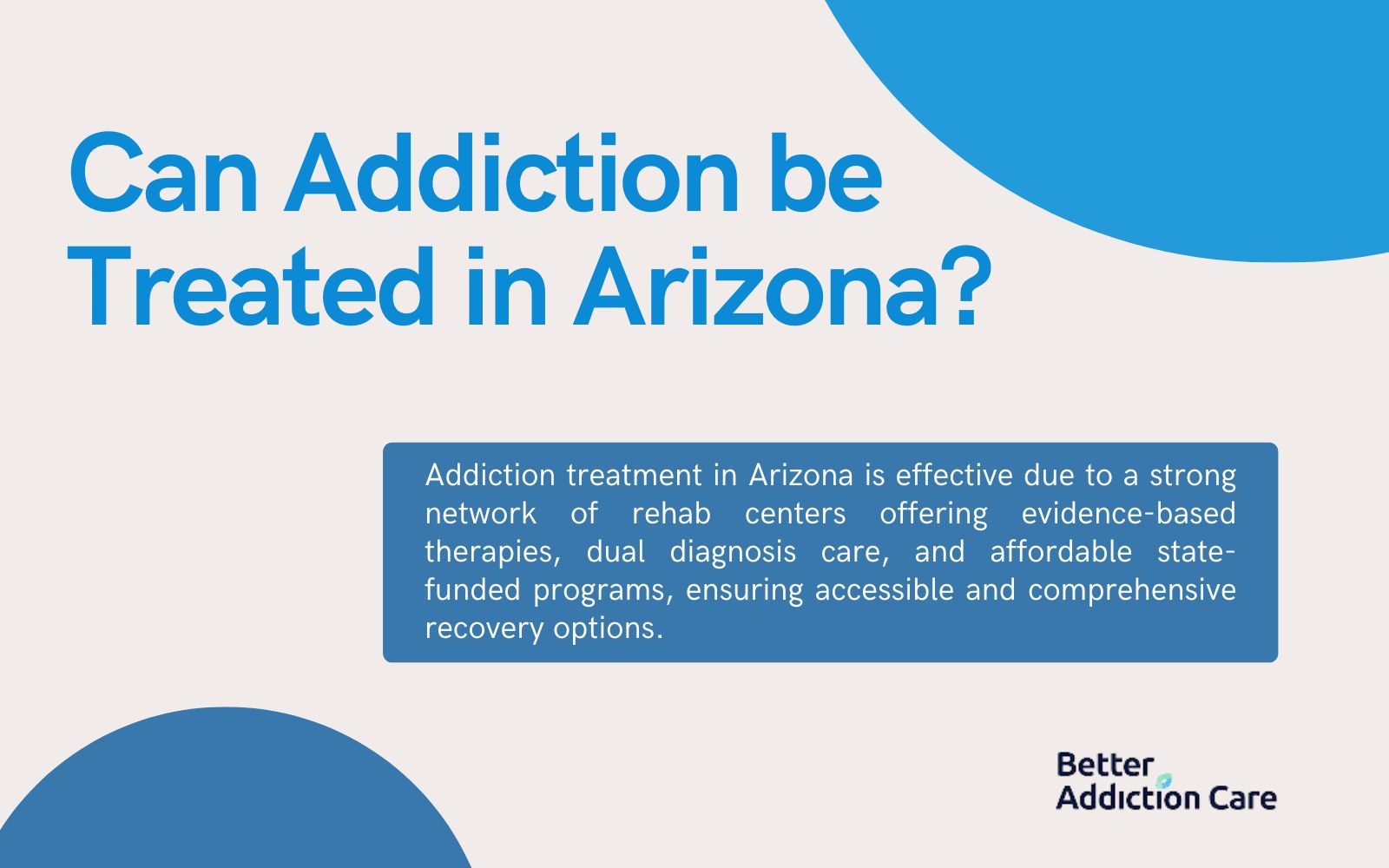
Arizona's healthcare system includes numerous specialists and support programs focusing on dual diagnosis, addressing both addiction and underlying mental health conditions, which is crucial for long-term recovery. Many facilities in Arizona provide individualized care plans and have access to state-funded programs that assist with treatment costs, making quality care more accessible to residents and out-of-Arizona patients.
What is the state of Arizona?
The state of Arizona is located in the southwestern region of the United States. It shares borders with California to the west, Nevada to the northwest, Utah to the north, New Mexico to the east, and the Mexican states of Sonora and Baja California to the south. Arizona's population is 7.3 million, with a fairly even split between males (49.7%) and females (50.3%).
In terms of wealth, Arizona's median household income is $77,315, which is close to the national average. The state of Arizona’s economy is diverse, including industries such as technology, tourism, mining, and agriculture. While some urban areas like Phoenix and Scottsdale are quite affluent, rural parts of Arizona face higher poverty rates, creating a mix of economic conditions.
What is the population of Arizona?
The population of Arizona is 7,431,344, as of July 2024. The gender distribution is nearly balanced, with males accounting for 3,715,000 and females slightly higher at 3,716,000, each making up 50% of the total population. Regarding age demographics, the youngest group, under 5 years old, (402,636) represents 5.4%, while children aged 5 to 9 are (434,414) account for 5.8%. Individuals aged 10 to 19 are (480,835) makeup 12.9% collectively, and those in their twenties (20-29) contribute (501,362) equating to 13.4%. The population in their thirties (30-39) stands at 456,329 which is 12.6%, and people in their forties (40-49) are 421,576 representing 11.6%. The group aged 50-59 are 428,590 accounts for 11.4%, while those between 60-69 years are 396,880 hold a share of 11.1%. Seniors aged 70-79 are 255,045 representing 8.1%, and the elderly population aged 80 are 138,895 and over accounts for 4%.
What is the income of people from Arizona?
The income of people from Arizona stands at $41,290 per capita, while the median household income is $77,315. When looking at income by gender for individuals aged 15 and older, males have a median income of $45,509, whereas females earn a median of $32,123. Among full-time, year-round workers, male earnings rise to $59,700, with females earning $51,289. The income figures also differ across age groups, with individuals aged 15 to 24 averaging $27,865. Those aged 25 to 44 have an average income of $44,231, and people between 45 and 64 earn $53,865. The 65 to 74 age bracket averages $51,800, while those aged 75 to 84 make $41,234. Seniors aged 85 and above have an average income of $36,093. In Arizona, income statistics vary across different demographics.



